American Legislative Exchange Council
description: a nonprofit organization that facilitates collaboration between legislators and corporations to draft model legislation
41 results
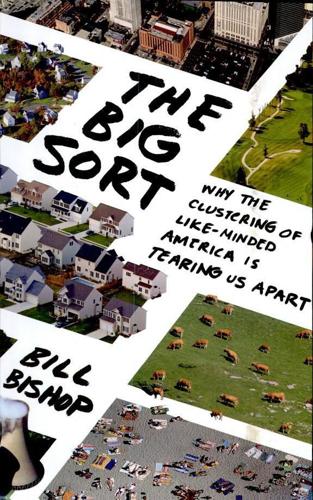
The Big Sort: Why the Clustering of Like-Minded America Is Tearing Us Apart
by
Bill Bishop
and
Robert G. Cushing
Published 6 May 2008
The ballroom at the Gaylord Texan hotel, a continent-size resort near the Dallas airport, holds just over 7,000, and in the summer of 2005, it was packed with mostly Republican state legislators, staff, lobbyists, and representatives from the Fortune 500, the Russell 1000, and, it seemed, half the businesses found in the Dallas yellow pages, all trampling over the gold and maroon carpet decorated with massive woven belt buckles, Stetsons as big as Pontiacs, and longhorns that stretched twenty yards tip to tip—a rug clearly ordered from the J. R. Ewing Collection. At that time, there were about 7,500 state legislators in the United States. Some 2,000 of them were there for the thirty-second annual meeting of the American Legislative Exchange Council (ALEC). President George W. Bush addressed the crowd from a riser set between jumbo screens that later listed the event's sponsors: Boone Pickens, Exxon, Peabody Energy, Pfizer, R. J. Reynolds, and the National Association of Home Builders. Nothing is really hidden about this joint venture of legislators and industry.
…
By the 1990s, ALEC had become the "voice of corporate America in the states."5 The story ALEC members tell of the organization's founding is somewhat less awe-inspiring. Mark Rhoads was working for a member of the Illinois senate in 1973 when he proposed a "caucus for conservative lawmakers with a conservative staff." Rhoads called this new outfit the Conservative Caucus of State Legislators, switching to the American Legislative Exchange Council after consulting with other activists. "Times were different in 1973," Rhoads told me. The word "conservative" wasn't a particularly good draw. Conservatives at the time felt powerless. In the late 1960s and early 1970s, every institution appeared to be under the dominion of big-government types—the foundations, the mainline denominations, Congress, the existing organization of state legislators.
…
Binder, "Elections and Congress's Governing Capacity," Extensions: A journal of the Carl Albert Congressional Research and Studies Center (Fall 2005). 10–14. 4. Defenders of Wildlife and Natural Resources Defense Council, "Corporate America's Trojan Horse in the States. The Untold Story Behind the American Legislative Exchange Council," 2002, http://alecwatch.org/report.html. 5. People for the American Way and Defenders of Wildlife Action Fund, "ALEC and the Battle of the States," January 2003, http://www.pfaw.org/pfaw/dfiles/file_169.pdf. 6. Jason DeParle, "Goals Reached, Donor on Right Closes Up Shop," New York Times, May 29, 2005, p.
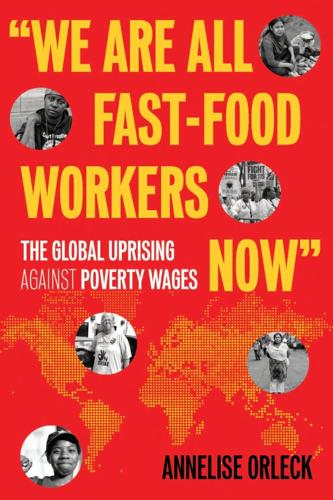
We Are All Fast-Food Workers Now: The Global Uprising Against Poverty Wages
by
Annelise Orleck
Published 27 Feb 2018
See also farmworkers; land theft; migrant workers/undocumented migrants Agricultural Labor Relations Board (ALRB), California, 203 agroecology practices, 230–31, 233, 248–49 Aguinaldo, Emilio, 234 airport workers, 79–80 Akhter, Nazma, 139–40 Akter, Kalpona: campaign against workplace violence, 55; changing view of activists, 49; organizing strategies and activities, 32, 37, 39–41, 116, 118–19; 146–47; on the Rana Plaza factory collapse, 135; retaliation against, 139; sponsors, 39; and the Tazreen factory fire, 137–38; on working conditions for Bangladeshi garment workers, 119–20, 131–34, 136–37. See also Bangladesh Fire and Safety Accord; garment industry Alfreda, Zapoteca migrant field-worker, 213-14, 222 alcohol, as wages, 19, 209 ALEC (American Legislative Exchange Council), 81–82, 96, 255 Allen, Will, 197 Alliance of Progressive Labor, 49, 63, 167, 173–74 Alta Gracia Project, Dominican Republic, 249–50 Altieri, Miguel, 248–49 Amazon, working conditions at, 103 American Legislative Exchange Council (ALEC), 81–82, 96, 255 amnesty programs, for migrant workers, 219, 224 Anacapa, frozen berry distributor, 202 Apartheid Group Areas Act of 1950, 244 Aquino, Benigno, III, 180–81 Aquino, Corazon, 172, 180, 235 Aran, Virgilio, 57–59 Arcos Dorados (McDonald’s in Brazil), court case against, 73–74 Arroyo, Gloria Macabal, 180 Arthur Svensson International Prize, 154–56 Asbed, Greg, 253 ASEAN-India trade pact, 183 Asia Floor Wage, 152 Asian Indigenous Peoples Pact, 231–32 Asian Peasants’ Coalition, “Day of the Landless” actions, 183–84 Ath Thorn, 135, 152, 155–57 Atienza, Em, 45, 49, 99, 240 Bagong Silangan barangay dancers, 62–63 Baja California, Mexico, berry picking, 16, 213–15, 216–17 Baker, Ella, 59 Balcazar, Enrique “Kike,” 192–93, 195, 197–99 Bangladesh: garment industry in, 119–20, 123–24, 134; minimum wage increases, 141; monitoring of social media in, 44; organizers/activists in, 45, 139–40, 145, 147; preferential trade status, 19–20; response to protests, 128, 148, 158; Tuba Group demonstrators, 143.
…
Right-to-work bills were first introduced amid the anti-Communist fervor of the 1950s and 1960s. For decades, they remained limited to the South and a few Rocky Mountain states. Where they became law, union membership plunged, poverty rates rose, gaps between men and women grew. In the 2010s, “right-to-work” returned with a vengeance, courtesy of the American Legislative Exchange Council (ALEC), a consortium of business leaders and conservative politicians that, by 2011, included one-quarter of the country’s state legislators and eighty-five members of Congress. Their goal was to roll back the tide of wage increases and strip local governments of the right to lift wage floors or guarantee paid time off.
…
It was simple, Janis recalls: If you change contractors, you must give workers ninety days’ notice, move them to a new job, recognize their union if at least 50 percent are unionized. That model for fighting the worst effects of subcontracting is as replicable as any anti-labor law generated by the American Legislative Exchange Council (ALEC), Janis believes. But in the age of state preemption laws, activists will have to work on the state level as well as the local. In California, they have been able to do that. Los Angeles also passed the first broad living-wage ordinance in the country, in 1997, expanding a narrower one that had passed in Baltimore in 1994.
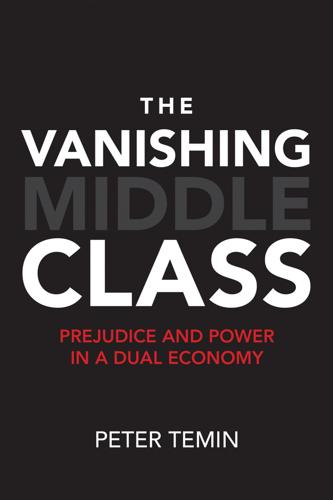
The Vanishing Middle Class: Prejudice and Power in a Dual Economy
by
Peter Temin
Published 17 Mar 2017
They can, however, support points of view by choosing who to hire and retain in return for tax-exempt contributions by corporate interests. This kind of influence extends from general think tanks like the Brookings Institution, which supports corporate efforts to rebuild damaged cities, to the United States Institute for Peace, which supports defense spending here and abroad.11 The conservative American Legislative Exchange Council, known as ALEC, was formed in 1973 in order to influence state legislation. Charles and David Koch founded and funded ALEC as a nonprofit corporation to advance conservative principles of free market, limited government, and individual liberty. ALEC drafts model legislation to achieve these ends and distributes them to state legislation.
…
And of course, they have all experienced disappointments as whatever they were able to do was limited in the face of the forces of racecraft.12 Unlike the 1 percent as a whole who give money and talk to government officials, some members of the Forbes 400 formed a secret organization in the 1970s to promote their ends. Charles Koch, who with his brother, David, is in fifth place in the 2015 Forbes 400, was energized by Powell’s secret memo of 1971. He started ALEC, the American Legislative Exchange Council, in 1973. This state lobbying organization operates under the radar of most people interested in national politics because even interested observers cannot keep all states in view. But, as explained in chapter 2, ALEC is most successful when state legislators lack resources of their own to investigate proposed laws.
…
The shadowy trail of prisons for immigrants provides glimpses of what goes on in the varied jails and prisons around our country.21 The private prison firms communicate their interest in more prisoners to state legislators in various ways: by campaign contributions, personal relations, and lobbying. The Corrections Corporation of America has spent over $20 million on political campaigns and lobbying and is continuing these efforts today. They also lobby through the American Legislative Exchange Council (ALEC), the conservative, nonprofit organization founded and funded by the Koch brothers in 1973 and described in chapter 2. ALEC promoted model bills on mandatory minimum sentencing and three-strikes legislation that helped promote the growth of mass incarceration in the 1990s. The influence of the private prison firms and ALEC impedes efforts to reduce American incarceration.
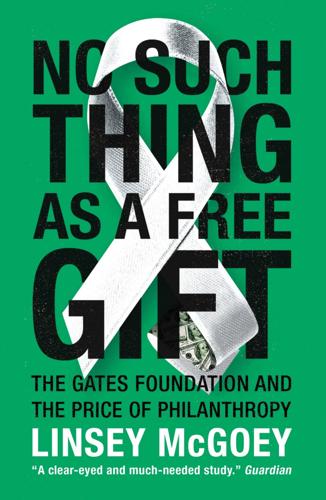
No Such Thing as a Free Gift: The Gates Foundation and the Price of Philanthropy
by
Linsey McGoey
Published 14 Apr 2015
In 2001, a year after ECOT was established, an investigation by Ohio state auditors found that while the state had paid ECOT to educate more than 2,000 students during one month, only seven children had logged on to ECOT’s computer system. Stephanie Mencimer from Mother Jones reports that state auditors were unable to determine ‘whether the rest of its student body even existed’.32 For companies such as K12 and ECOT, the primary vehicle for influencing state policy is the American Legislative Exchange Council (ALEC), an organization that has introduced dozens of model bills on digital education adopted by state legislatures across the US in recent years. ALEC is a registered charity managed by a rotating board of individual state legislators who pay $50 a year to belong to the organization.
…
Index Africa: and African markets, 216–9, 222; agricultural challenges in, 216–7, 221–2; and Alliance for a Green Revolution in Africa, 217, 218; and the Alliance for Food Sovereignty in Africa, 228; and Coca-Cola, 222–3; and diseases, 190–1, 223–4; economic infrastructures in, 39, 170–1; and genetically modified maize, 218–9; Ghana, 1–3, 5, 21, 150, 170–1; and Monsanto, 206, 216–9, 221–2; and M-PESA bill-pay system, 81–2; Uganda, 14, 219, 228; and World Food Programme’s Purchase for Progress, 208; and World Health Organization, 226 African Americans: and education, 10, 54; and schools established by Rosenwald, 118; as source of labour for industrialists, 46–7; and students’ gap in test scores, 138; and voting rights, 45 Allen, Paul, 181–3 altruism, 48, 90, 146 American Legislative Exchange Council, 131–2, 200 Apotex, 103–4 Apple, 143, 246 Argentina, 188–9 Ashoka, 66, 68, 72 Asia: and Coca-Cola, 222–3; and World Food Programme’s Purchase for Progress, 208; and World Health Organization, 226 Balsillie, Jim, 106–7, 245 Band, Doug, 29–32 Barefoot College, 67, 68 Barkan, Joanne, 128, 139, 140, 144 Bastiat, Frédéric, 198, 200 Baudelaire, Charles, 12–13, 14 Berkshire Hathaway, 8, 173–4, 215 Bishop, Matthew, 6, 7, 8, 111 Bloomberg, Michael, 127–8 Boldrin, Michele, 199–200 Bourdieu, Pierre, 19–20, 65 Brazil, 17, 96, 221 Broad Foundation, 9, 122, 139 Buffett, Howard, 216, 221 Buffett, Warren: and Berkshire Hathaway, 173, 216; and Coca-Cola, 173, 222; as a donor to African farming programmes, 216; and Gates Foundation, 8, 173, 174; and the Giving Pledge, 24, 117; and Goldman Sachs, 215; and philanthropy, 24, 26, 146 Bush, George H.
…
B., 46, 47 Duncan, Arne: and charter schools, 139; and No Child Left Behind, 121; and performance pay for teachers, 139; and Race to the Top, 144 Duti, Vida, 177–8 Dvorak, John, 183–4 economics: and agricultural commodities, 212–3; and capital gains tax, 22; and commodities markets, 210–4; and currency speculation, 22; and economic development, 30, 38–9; and global financial markets, 27, 86; and governmental and philanthropic aid, 38–9, 84–7; and Henry George, 115; and impact investing, 80–1; and income inequality, 24, 39; and laissez-faire policies, 51, 93, 179, 236–8; and Ludwig von Mises, 236; and microfinance, 7–8, 21, 63, 68, 77–81, 83–4; and patents, 180; and positive capacity of business, 17, 86–7; and pro-market solutions, 86; and social entrepreneurs, 63, 66–72, 86–7; and state planning, 235–6; and supply-side economics, 111–2; and tacit knowledge, 235–6; and tax cuts for the wealthy in the UK, 76; and treatment of poor countries by IMF and World Bank, 171–2; and virtues of free-market, 239 education: and African Americans, 10, 54, 118; and American Legislative Exchange Council’s conservative agenda, 132; and Arne Duncan, 139; and Broad Foundation, 9, 122, 139; and charter schools, 118, 123–8, 131; and college acceptance rates, 134; and Common Core, 137–8; and debate over class size, 127–8; and efforts of Carnegie and Rockefeller, 27–8; and evaluation of teachers using value-added modelling, 140–2, 144; and firing of teachers, 139; and for-profit schooling, 133; and funding for the Measure of Effective Teaching study, 140–1; and Gates Foundation, 27–8, 121–2, 132–47; and gathering of data on students, 133–4; governmental spending on, 8–9; and growth of charity schools, 92; and higher education, 121, 242; and John Dewey, 72; and Michigan’s schools, 133; and No Child Left Behind programme, 118–22, 139, 240; and online schools, 129–31; and Peer Assistance and Review programme, 144; and performance pay for teachers, 139, 145; and poverty, 7, 128–9; and primary and secondary schools, 9, 24, 115, 122, 129–30; and privatization of public education, 116; and Progress in International Reading Literacy Study, 128; and public education, 109; and public shaming of teachers, 142, 144–5; and Race to the Top, 139, 144; and standardized testing for students, 134, 139; and teacher effectiveness, 134, 139, 140–2, 144; and teacher performance, 132, 138–42, 144, 145; and teachers’ remuneration, 127, 134, 139; and US students compared to international peers, 128; and value of teachers, 126–7, 140; and views of Maria Montessori, 72; and William Bennett, 130 Edwards, Michael, 8–9, 229, 241 Eisenberg, Pablo, 229–30, 234 Eli Lilly, 104–5 Elkington, John, 66–7 Emerson, Jed, 80–1 Emerson, Ralph Waldo, 11–12, 245 Ford, Henry: business practices of, 56–8; and the Dearborn Independent, 57; and employees’ productivity, 56; as an opponent of labour unions, 56; and philanthropy, 11, 56, 117; and shorter work week, 56; as supporter of high wages, 56–7 Ford, Henry, II, 60–1 Ford Foundation: establishment of, 56; and McGeorge Bundy, 61; money of, 22; and philanthropy, 28; projects of, 58 Ford Motor Company, 56–7, 60–1 Foucault, Michel, 114, 147 Foundation for Excellence in Education, 132, 133 Foundation Strategy Group, 89–90 France, 220, 237 Freeland, Chrystia, 64, 108, 199–200 Frick, Henry Clay, 10–11, 42–3 Fries, Foster, 108, 109, 111 Galbraith, James, 24, 111 Gandhi, Mahatma, 68, 72 Gates, Bill: as a businessman, 246; and campaign for a global tax on currency speculation, 22; and Coca-Cola, 174, 222; and Common Core, 137; donations of, 22–3, 85, 108, 117; and efficiency of philanthropic spending, 24; and ethical investing, 175; and favoring increase in class size, 127–8; and fight against AIDS, 193; and fight against polio, 154, 155, 157, 159; and focus on Africa, 223–4; fortune of, 9, 177, 183; and funding for Purchase for Progress programme, 207–8; and the Giving Pledge, 24, 117; and global health issues, 177, 192; as head of Gates Foundation, 21, 107, 244; and home in Seattle, WA, 134, 245–6; and interest in Carnegie’s writings, 41, 111; and intervening to try to delay guidance on antiretrovirals, 196–7; and investment in companies with bad records on health issues, 173; and patent rules, 205; philanthropic ethos of, 183, 245; and philanthropy, 5–7, 9–10, 23–4, 26, 116–7, 146, 159; and position on intellectual property, 198–9; and pre-exposure prophylactic treatments for HIV, 194; and presence at G20 consultations, 154; and primary and secondary schools, 9, 24; and public shaming of teachers, 142, 144–5; and science grants for minority students, 59; and small schools, 134–6; and support for HIV prevention, 193; and support for increasing the capital gains tax, 22; and support of charter school movement, 125–6; and support of tighter firearms controls in WA, 23; and taxes paid by Gates Foundation, 85; and teacher performance, 126; and teachers’ remuneration, 127; and time at Harvard, 63, 181, 182, 183; as trustee of Gates Foundation, 8, 174; and views on foreign aid, 27; and views on patents, 26, 181, 186; and wealth tax, 24; and William H.
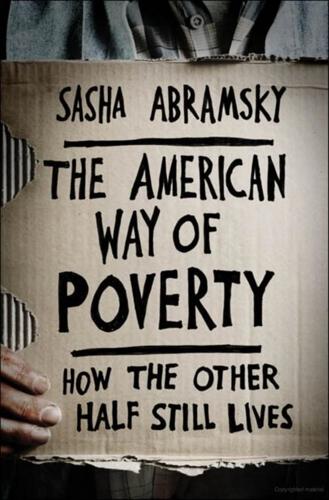
The American Way of Poverty: How the Other Half Still Lives
by
Sasha Abramsky
Published 15 Mar 2013
By 2012, twenty-three states had adopted so-called “right to work” laws, which made it harder to organize workers into trade unions. The “right” they codified was, in reality, a right to work for lower wages than was the case in states where unions retained more power. A majority of these states were in the South; but, increasingly, as conservative groups such as the American Legislative Exchange Council and the U.S. Chamber of Commerce championed the legislation, this was a movement with national legs. States such as Utah and North Dakota adopted these laws in the 1950s; Idaho, which had once had a proudly militant union culture, in 1985; Indiana, in 2012. In states with these laws, union membership plummeted, and, predictably, wages fell.10 As a result, even before the Great Recession hit, real incomes for working-class Americans were lower in the early 2000s than they had been a generation earlier.
…
For employees, too often it was a place of crushing drudgery.12 Unfortunately, where Texas goes, so goes much of the nation, an argument developed by New York Times columnist Gail Collins, in her 2012 book As Texas Goes. Increasingly, at the state level, conservative GOP legislators and governors, at the urging of groups such as the U.S. Chamber of Commerce and the American Legislative Exchange Council, have moved against public sector unions, welfare recipients, against services offered by federally funded programs like Medicaid, and even against the unemployed—in Florida and elsewhere, legislators have pushed for unemployment insurance applicants to have to be fingerprinted and drug-tested, essentially putting in place practices that send out the none-too-subtle signal that the unemployed are to be viewed and treated as criminals.
…
First, existing programs, both for the unemployed or jobless, and also for the working poor, have withered, either through benign neglect or through active political opposition—an assault on the Keynesian project, launched by think tanks such as the Heritage Foundation, policy-crafting entities such as the American Legislative Exchange Council, and business organizations such as the U.S. Chamber of Commerce. In 1996, 45.7 percent of poor kids were getting some form of cash assistance from the government. Thirteen years later, only 18.7 percent received such aid. “The Great Recession,” Randy Albelda wrote in a report for Dollars and Sense, “pushed 800,000 additional families into poverty between 2007 and 2009, yet the TANF rolls rose by only 110,000 over this period.”1 And, she might have added, most of those receiving TANF benefits were getting far smaller monthly checks than they had been a few years earlier.
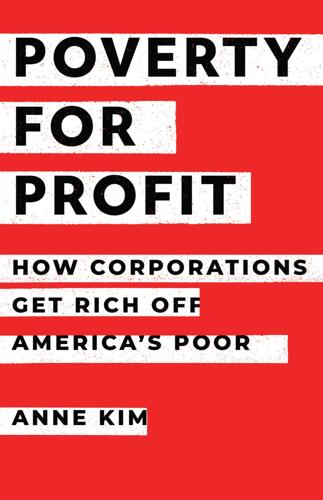
Poverty for Profit
by
Anne Kim
Not content to sit on its laurels, the industry spent at least $3.1 million from 2002 to 2011 trying to influence state policies on bail and pretrial justice, the Justice Policy Institute further reports.31 The bail industry’s big wins in the 1990s were helped along by the conservative American Legislative Exchange Council (ALEC), which drafted and advocated industry-friendly “model legislation” expanding the use of bail and tilting state laws in favor of commercial bondsmen. For instance, ALEC’s model “Crimes with Bail Restrictions Act” called for the mandatory imposition of bail for certain offenses, including murder and sexual assault and also “theft by extortion” and “resisting arrest.”32 Echoes of this proposal live on today in the many jurisdictions where “bail schedules” dictate the bail that judges must impose.
…
“The High Price of Bail,” Justice Policy Institute, https://justicepolicy.org/wp-content/uploads/2022/02/high_price_of_bail_-_final.pdf. 30. Ibid. 31. Ibid. 32. These model policies have been taken down from the ALEC website but are available from the internet archive. “Crimes with Bail Restrictions Act,” American Legislative Exchange Council, https://web.archive.org/web/20161008032906/https://www.alec.org/model-policy/crimes-with-bail-restrictions-act/(archive). 33. “2022 Felony Bail Schedule,” Superior Court of California, County of Los Angeles, https://www.lacourt.org/division/criminal/pdf/felony.pdf. 34. “California’s Cannabis Laws,” State of California Department of Cannabis Control, https://cannabis.ca.gov/cannabis-laws/laws-and-regulations/; Michel Martin, “5 Years After California Legalized Weed, the Illicit Market Dominates,” NPR, November 7, 2021. 35.
…
“California’s Cannabis Laws,” State of California Department of Cannabis Control, https://cannabis.ca.gov/cannabis-laws/laws-and-regulations/; Michel Martin, “5 Years After California Legalized Weed, the Illicit Market Dominates,” NPR, November 7, 2021. 35. “Bail Forfeiture Relief and Remission Act,” American Legislative Exchange Council, https://web.archive.org/web/20170413084531/https://www.alec.org/model-policy/bail-forfeiture-relief-and-remission-act/(archive). 36. §903.28, Fla. Stat. (2005). 37. Ibid. 38. Va. Code Ann., §9.1-185.8 (2019). This law provides that “a licensed bail bondsman shall not charge a bail bond premium less than 10 percent or more than 15 percent of the amount of the bond.” 39.
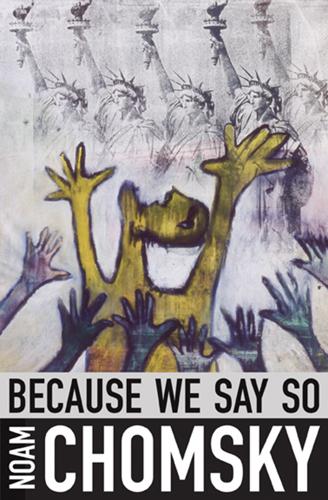
Because We Say So
by
Noam Chomsky
These majorities were maintained between 2006 and 2010 and shrank somewhat after that. . . .” The fact that the public is influenced by science is deeply troubling to those who dominate the economy and state policy. One current illustration of their concern is the “Environmental Literacy Improvement Act” proposed to state legislatures by ALEC, the American Legislative Exchange Council, a corporate-funded lobby that designs legislation to serve the needs of the corporate sector and extreme wealth. The ALEC Act mandates “balanced teaching” of climate science in K–12 classrooms. “Balanced teaching” is a code phrase that refers to teaching climate-change denial, to “balance” mainstream climate science.
…
Index Abrams, Elliott, 87 Abu Muamar, Mustafa, 27 Abu Muamar, Osama, 27 Acheson, Dean, 138 Adamsky, Dmitry, 164 Affordable Care Act, 136 Afghanistan, 33, 84, 116, 154, 160, 178 Africa, 26, 86, 155, 176, 180 African National Congress, 32 African Union (A.U.), 25–26, 179–180 AFRICOM, 25 Ageel, Ghada, 101 Ahmed, Akbar, 160 al-Khawaja, Abdulhadi, 48 Allende, Salvador, 111 al-Libi, Abu Anas, 137 Allison, Graham, 55–57 Al-Muslimi, Farea, 105, 106 Alperovitz, Gar, 93 al-Qaida, 178 American Enterprise Institute, 135 American Legislative Exchange Council (ALEC), 95 American Newspaper Publishers Association, 29 Anaya, James, 47 Anglosphere, 100 Angola, 156 Arab League, 26 Araboushim, 74 Arafat, Yasser, 125 Aristotle, 150 Asia, 171, 176, 191 Assad, Bashar, 190 Assange, Julian, 61 Atwan, Abdel Bari, 178 Australia, 100, 118 Austria, 122 Baghdad, 189 Bagram, 32 Bahrain Center for Human Rights, 48 Baker, Peter, 169 Barsamian, David, 89 Baskin, Gershon, 79 Basque region of Spain, 93, 147 Batniji, Rajaie, 74 Becker, Jo, 52 Bedouin, 27 Belgian Congo, 180 Belloc, Hilaire, 165 Ben-Gurion, David, 100 Benn, Aluf, 79 Besikci, Ismail, 49 Bill of Rights, 31 bin Laden, Osama, 105, 106 Birol, Fatih, 23 Blackstone, William, 51 Blair, Tony, 189 Bolender, Keith, 56 Bolivia, 54, 123 Boron, Atilio, 121 Bosch, Orlando, 124 Bosnian enclave of Srebrenica, 46 Boston, 105, 107, 109 Brandeis, Louis, 62 Branfman, Fred, 107 Brazil, 25, 42, 140, 153 BRICS countries, 25 Britain, 25, 36–37, 116, 174 Brookings Institution, 160 Brooks, David, 131, 132 Brzezinski, Zbigniew, 143 Burchinal, David, 55 Bush, George H.
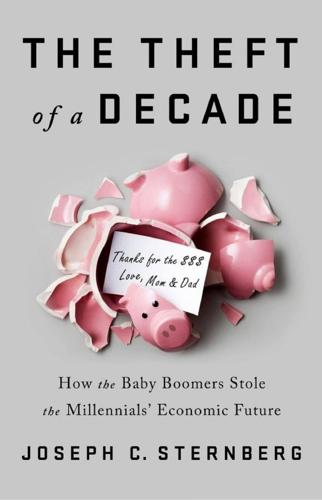
The Theft of a Decade: How the Baby Boomers Stole the Millennials' Economic Future
by
Joseph C. Sternberg
Published 13 May 2019
For instance, the median state retirement-plan administrator in 2016 assumed a future investment return of 7.5 percent, at a time when the interest rate on thirty-year Treasury bonds was barely above 2 percent.25 Correcting for those implausible estimates can yield wildly varying guesses as to the true state pension shortfall. One of the more alarmist, but still plausible, estimates comes from the right-wing American Legislative Exchange Council, which pegs a funding shortfall of around $6 trillion using a discount rate of around 2.1 percent.† By their reckoning, states have only around 34 percent of the assets on hand that they’d need to meet their future obligations to current and future retirees.26 The one thing that unites all of these fiscal gaps, whether for Social Security, Medicare, or state and local pensions, is that someone will have to pay more for them in the future, or some beneficiaries will have to receive less.
…
Boards of Trustees, Federal Hospital Insurance and Federal Supplementary Medical Insurance Trust Funds, “2018 Annual Report of the Boards of Trustees of the Federal Hospital Insurance and Federal Supplementary Medical Insurance Trust Funds,” June 5, 2018. 23. Ibid. 24. Pew Charitable Trusts, “The State Pension Funding Gap: 2016,” Brief, April 2018. 25. Ibid. 26. Thurston Powers, Elliot Young, Bob Williams, and Erica York, “Unaffordable and Unaccountable 2017,” Report from the American Legislative Exchange Council, December 13, 2017. 27. Board of Trustees, “2018 Annual Report.” 28. Ibid. 29. Ibid. 30. Ibid. 31. Federal Reserve Bank of St. Louis and US Office of Management and Budget, Federal Surplus or Deficit as Percent of Gross Domestic Product, retrieved from Federal Reserve Bank of St.
…
Index Abe, Shinzo/“Abenomics,” 206–207 abortion views, 217n Affordable Care Act/Obamacare “Cadillac tax,” 167, 168 CLASS (Community Living Assistance and Support) program, 169 Congressional Budget Office on, 168 description/problems, 166–170, 186, 233 education loans and, 100 employers and, 66–69 labor costs and, 66–69 Medicaid and, 167 medical-device tax and, 167, 168 Millennial support, 218–219 overtime rule/effects, 68–69 subsidies and, 66, 67n, 167 African economies, 178–179 Alternative Minimum Tax provision and inflation, 169 American Legislative Exchange Council, 159 amortizing mortgage, 120, 120n Anderson, Kristen Soltis, 215 Andreessen, Marc, 41 Asian Financial Crisis, 206 Auerbach, Alan J., 171–172 Autor, David, 35–36 Average is Over (Cowen), 41–42 avocado/coffee controversy, 1–3 “avolatte,” 3 Bagehot, Walter, 130 bailouts with financial crisis, 59 “Basel” standards, 138n Bear Sterns, 11, 128, 129 Benson, Guy, 215 Bernanke, Ben financial crisis/aftermath and, 60, 64, 129, 130, 132, 133, 134 interest rate at/near zero and, 132, 133 Bertelsmann Foundation think tank, 199 birth cohort vs. generations, 7 BNP Paribas bank, 128, 180 Boomers childhood era, 46–47 definition/description, 6, 7, 8 government views, 221–222 near-lifetime employment and, 46–47 numbers, 8 politicians/policy and, 18, 19–21 retirement finances and, 80, 81 working/voting beginnings and, 51 See also specific activities; specific individuals Britain/Millennial housing disposable income and, 178, 188–189 “green belts,” 191 Help-to-Buy programs, 192–193 housing shortage reasons, 191–192 housing shortages, 187–192, 195 interest rates/Bank of England and, 192–193 living with parents, 188 locations/London and, 189n, 190, 195 middle class, 188 overview, 187–195 ownership encouragement/consequence, 192–194 ownership statistics, 190 problems summary, 194–195 rent costs and, 189n “shared ownership,” 192 subsidies/taxes and, 192, 193 zoning/process, 191–192 Britain/Millennials economic growth and, 189 unemployment and, 189 United Kingdom minimum wage and, 184 Brynjolfsson, Eric, 41 Buchanan, Pat, 217 Bunkeddeko, Adem, 219 Burns, Scott, 172 Bush, George W.
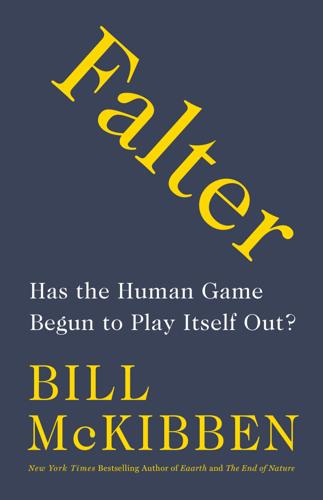
Falter: Has the Human Game Begun to Play Itself Out?
by
Bill McKibben
Published 15 Apr 2019
It was increasingly clear that the Kochs had milked the administration for what they really wanted (tax cuts, deregulation, Supreme Court justices) and were now looking forward to the Pence years. And their work was by no means confined to Washington. Many state governments have been transformed by the Koch-funded American Legislative Exchange Council. Meanwhile, in cities and towns across America, the Kochs ran expensive campaigns opposing projects such as public transit, both because it dried up demand for the gasoline they sold and because buses and trains “go against the liberties Americans hold dear.” As a spokesman for Americans for Prosperity patiently explained, “If someone has the freedom to go where they want, do what they want, they’re not going to choose public transit.”17 Especially if there isn’t any.
…
By 2017, as countries around the world accelerated their efforts to put up windmills and solar arrays, growth in rooftop solar came to a “shuddering halt” in the United States, mostly because of a “concerted and well-funded lobbying effort by traditional utilities, which have been working in state capitals across the country to reverse incentives,” according to the New York Times.30 The utilities had turned to the (Koch-funded) American Legislative Exchange Council for model legislation, and in one place after another, Koch-funded utility commissions were putting the brakes on renewables. Take Arizona, which should be about the easiest place on the planet to make solar power work—Phoenix boasts 299 sunny days a year. On an agreeably cool March morning a few years ago, I stood on the roof of a suburban ranch house in Surprise, a suburb of Phoenix, with Elon Musk’s cousin Lyndon Rive, who was at the time the CEO of Solar City, the biggest installer of rooftop solar in the country.
…
Abou, Naore accelerating information returns Adirondacks Advanced Cell Technology Africa African Americans agriculture AIDS/HIV air-conditioning air pollution Alabama Alaska Alberta Alcor Algeria algorithms Allen, Paul alligators Allpress, Bob Alpha Centauri Altman, Sam altruism Amazon (company) Amazon Basin Ambrosia American Legislative Exchange Council (ALEC) American Petroleum Institute (API) American Revolution Americans for Prosperity American Society for Testing and Materials Amoco Andrea, Lembris Anoh, Jean Antarctica anthrax Anthropocene epoch Apollo missions aquifers Arab Spring archaeology Archer Daniels Midland Arctic aridification Aristotle Arizona Arizona Public Service (APS) Armstrong, Lance Armstrong, Neil artificial general intelligence (AGI) artificial intelligence (AI) Ashland, Kansas asphalt shingle Athens athletes Atlas Shrugged (Rand) Atlas Society atmospheric temperature, rise in.
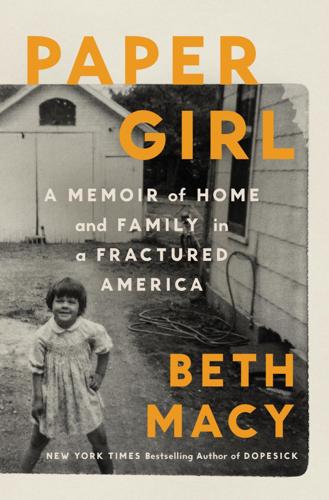
Paper Girl: A Memoir of Home and Family in a Fractured America
by
Beth Macy
Published 6 Oct 2025
See also farming Ailes, Roger, 118 Airport Café, 148 alcohol, 24, 26, 123, 234, 250, 277 alcoholism, 15, 22–24, 26, 34–35, 77, 134, 178, 240 ALEC. See American Legislative Exchange Council Alexander, Bruce, 178 Allen, Maddie, 212, 220, 222, 274, 276–77 at Clark State College, 75, 220, 272, 273 with transportation barriers, 75–76, 220, 221, 273, 275 Allender, Megan, 269 Allensworth, Elaine, 214 American Legislative Exchange Council (ALEC), 198 ancestry.com, 131 anger, 164, 165, 203, 270, 291 children with, 25, 50, 139, 215 politics and, 48, 180, 181, 183, 184, 205 rage, 24, 113, 153, 257 anti-abortion, 117, 120, 150, 159, 160, 163, 177, 255 Antifa, 186, 187, 205, 292 Antioch College, 149, 152 antisemitism, 207, 307 AP.
…
“We have to fight back,” she said.[10] In 2024, two Republican lawmakers in the statehouse introduced a bill that would not just allow groups like LifeWise to pull kids out of school for religious teachings but actually require religious-based instruction in all schools.[11] Oklahoma had already passed such a law; Texas would soon follow.[12] “Perhaps, in a show of fairness, these state officials could mandate the teaching of algebra in churches,” one critic quipped.[13] Heather Tiefenthaler, the local Democratic chair, worried about violence in the run-up to the 2024 presidential election. Nationwide, such laws are often penned and championed by the American Legislative Exchange Council, or ALEC, a nonprofit supported by the Koch brothers and other wealthy scions, including fossil-fuel and for-profit prison executives as well as some members of the Sackler family, whose OxyContin painkiller was the taproot of America’s opioid crisis. Among other initiatives, ALEC seeks to privatize education, strengthen gerrymandering, and champion voter suppression by generating model laws for state legislatures.[14] ALEC pushed red states to pass nearly eighty laws restricting what teachers could say about race, sexual orientation, and gender identification, according to a 2024 analysis by The Washington Post.[15] Coupled with an open-enrollment policy where many parents now send their kids to adjacent rural districts with better scores and higher graduation rates—“we joke that West Liberty is the Harvard of Champaign County,” Thiel said—pulling students out of public school propels a vicious cycle that weakens already distressed schools.
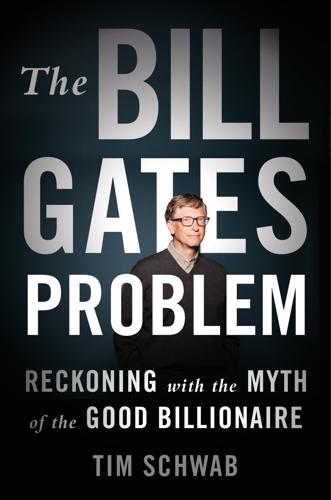
The Bill Gates Problem: Reckoning With the Myth of the Good Billionaire
by
Tim Schwab
Published 13 Nov 2023
under fire for driving segregation: Kate Zernike, “Condemnation of Charter Schools Exposes a Rift over Black Students,” New York Times, August 21, 2016, https://www.nytimes.com/2016/08/21/us/blacks-charter-schools.html. American Legislative Exchange Council: Yvonne Wingett Sanchez and Rob O’Dell, “What Is ALEC? ‘The Most Effective Organization’ for Conservatives, Says Newt Gingrich,” USA Today, April 3, 2019, https://www.usatoday.com/story/news/investigations/2019/04/03/alec-american-legislative-exchange-council-model-bills-republican-conservative-devos-gingrich/3162357002/. no longer give grants to ALEC: “Gates Won’t Pull ALEC Grant,” BuzzFeed News, April 10, 2012, https://www.buzzfeednews.com/article/buzzfeedpolitics/gates-wont-pull-alec-grant.
…
Nothing. Likewise, if the Gates Foundation can’t legally lobby on a given issue, what’s to stop Bill Gates from making a private donation to a nonprofit organization that can? Nothing. In 2011, the Gates Foundation made a charitable contribution to the corporate-backed right-wing American Legislative Exchange Council (commonly known as ALEC), infamous for its efforts to introduce its own draft legislation into Congress. The foundation had given ALEC charitable funds “to educate and engage its members on efficient state budget approaches to drive greater student outcomes, as well as educate them on beneficial ways to recruit, retain, evaluate and compensate effective teaching based upon merit and achievement.”
…
Abbott Laboratories ABC Abimbola, Seye AccessIBSA Achieve Acosta, Alex ACT Adeyi, Olusoji Aeras Affinivax Affleck, Ben Afghanistan Africa Africa Harvest Biotech Foundation International African Agricultural Technology Foundation African Centre for Biosafety African Fertilizer and Agribusiness Partnership African Leaders Malaria Alliance African Union Aga Khan University (AKU) Agricultural Transformation Agency (ATA) agriculture agrochemicals agroecology Air America Alexander, Ashok Alicia Patterson Foundation Al Jazeera Allen, David Allen, Paul Alliance for a Green Revolution in Africa (AGRA) Alliance for Food Sovereignty in Africa Alliance for Science Altair computer Amazon Ambani, Mukesh American Association of University Professors American Enterprise Institute American Federation of Teachers American Foundations (Dowie) American Legislative Exchange Council (ALEC) American Public Media America Online Anacor Pharmaceuticals Andrew, Prince Angell, Marcia Angelou, Maya Angola Aniston, Jennifer Annan, Kofi antibiotics antitrust Apollo Global Management Apple computers Appraising Microsoft Arjuna Capital Armstrong, Lance Arthun, Erika Asahi Shimbun Aspen Institute New Voices Fellowship Associated Press AstraZeneca Atlantic Atuire, Caesar A.
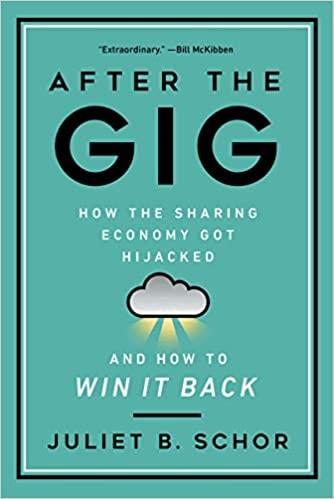
After the Gig: How the Sharing Economy Got Hijacked and How to Win It Back
by
Juliet Schor
,
William Attwood-Charles
and
Mehmet Cansoy
Published 15 Mar 2020
So far, platform activity has been concentrated in urban areas, because they provide sufficient density. To the companies’ dismay, municipalities are the most progressive unit of government in the U.S. and have been most active in passing regulations. So Uber embarked on a strategy that Big Tobacco, the National Rifle Association, and the ultraright, Koch-funded American Legislative Exchange Council (ALEC) have successfully pioneered—getting state legislatures to pass laws overriding local ordinances and regulation. In a mere four years (from 2014 through 2017), using language provided by ALEC, Uber and Lyft succeeded in getting forty-two states to pass laws with preemption provisions.34 This deregulation spree included taking away workers’ rights, outlawing employee status for drivers (in thirty-two states), and blocking city-wide minimum wages.35 Although they’ve been most successful in the United States,36 the big companies have also been pursuing a deregulatory strategy in Europe.37 The federal government has also been disinclined to regulate the companies.
…
Index Aaron, 56, 60, 98 Abigail, 10, 29, 60–61, 74, 79 access economy, 192 African Americans, 3; platform participation, 95; racial bias, 82, 84, 86, 88–89; and ratings, 92 AgentAnything, 35 Agyeman, Julian, 13 Airbnb, 2, 4–6, 38, 90–95, 151; access to, 46; costs, 155; deregulatory strategy, 158; earnings, 73; education levels, 98; in Europe, 153–54; financial model, 35; host incomes, 104; host satisfaction, 11, 52–53; and hotel industry, 102, 109; individual control, 77; induced travel effect, 119; lodger experience, 108; opposition to, 107; origin story, 24–25; racial bias, 82–84, 86–88; ratings by race, 91; regulation, 153–54, 157–58, 160; and rental/housing market, 105–6; residential segregation, 93–95; social interaction, 111–12; transaction fees, 86 #AirBnBWhileBlack, 82, 84 Alexandra, 129 algorithmic activism, 68 algorithmic control, 31, 66–70, 169 alienation, 3 Allegra, 84 Amazon, 151 Amelie, 28, 111 American Legislative Exchange Council (ALEC), 157–58 Amsterdam, 172 Amy, 141, 144 Anand, 54, 78 Andy, 54–55 Angela, 168 Angelo, 33, 154, 161–62 Anne, 128 apartment rentals, 160 Aptekar, Sofia, 146 Arnould, Eric J., 193 artificial intelligence (AI), 67 assembly line, 67 Atkin, Douglas, 37–38 Attwood-Charles, Will, 14, 68, 126, 137, 142, 179, 183, 191 Aviva, 131 background checks, 46 Barb, 29 Barcelona, 172–73 BarCola, 173 bartering, 125, 131 Baumann, Shyon, 134 “beer for work” economy, 131, 137–38 Belk, Russell, 193 Bellotti, Victoria, 145–46 Ben, 45 Benkler, Yochai, 163–64, 191, 193–94 Bev, 8–10 Bezos, Jeff, 95 Bill, 154 Blecharczyk, Nate, 37 blinding job destinations, 67 Bob, 142 Bologna, 172–73 Boston, 15–16, 58 Botsman, Rachel, 12, 16, 191 Bourdieu, Pierre, 138 Bowles, Samuel, 70 Brand, Stuart, 22 Brian, 139 Buffett, Warren, 95 Burnham, Brad, 38 Business to Business (B2B) platforms, 192 Business to Consumer (B2C) platforms, 192 Busque, Leah, 25, 34 Cain, Taylor, 181 California legislation, 161 Californian ideology, 21–24 Cameron, Lindsay, 68, 77 Camp, Garrett, 25 Cansoy, Mehmet, 14, 90, 182 capitalism: platform, 13, 30, 150–52; and sharing economy, 2, 6, 37–39; and work, 3–4; and young people, 7 Care.com, 27 Carfagna, Lindsey, 14, 126, 146, 178, 180 car sharing, 112, 114.
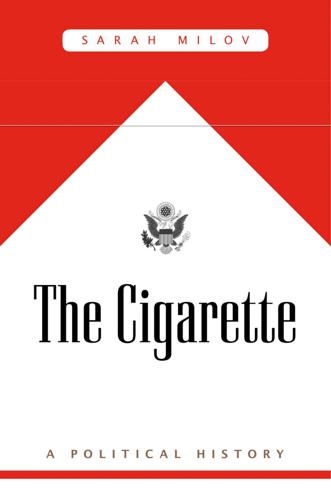
The Cigarette: A Political History
by
Sarah Milov
Published 1 Oct 2019
It is likely that Powell’s intimate familiarity with the cigarette’s rapid fall in social standing—and his observation of the industry’s attempts to thwart the trend—shaped his recommendation for American businesses writ large. By the late 1970s, Powell’s vision of corporate activism had inspired new forms of lobbying. The Tobacco Institute and some individual cigarette manufacturers became important contributors to the American Legislative Exchange Council (ALEC), the conservative nonprofit responsible for drafting and disseminating model legislation on a range of issues. In 1979, the executive director of ALEC wrote to the president of the Tobacco Institute to solicit financial support.125 The $10,000 yearly dues paid by member organizations were a good investment for an industry plagued with credibility problems.
…
Weissman, “Lewis Powell Recommendations Re: Cigarette Industry Environment”, September 22, 1969, Philip Morris Records, https://www.industrydocumentslibrary.ucsf.edu/tobacco/docs/yngb0131. 124. “Cigarette Industry Environment,” n.d., Philip Morris Records, https://www.industrydocumentslibrary.ucsf.edu/tobacco/docs/pngb0131. 125. K. Teague, American Legislative Exchange Council, December 28, 1979, Tobacco Institute Records, UCSF Library, https://www.industrydocumentslibrary.ucsf.edu/tobacco/docs/gnlv0134. 126. Memorandum from Angle Walker, December 10, 1981, Tobacco Institute Records, UCSF Library, https://www.industrydocumentslibrary.ucsf.edu/tobacco/docs/gzjb0033. 127.
…
See also farmers (of tobacco); Jim Crow regime; New Deal; race Agricultural Adjustment Act (1933), 48–53, 58, 65–71, 74, 258 Agricultural Adjustment Act (1938), 69, 71, 73–74, 98, 251, 292–293, 317n16 Agricultural Adjustment Administration, 51, 51–65, 72–77, 84–85, 103, 133, 324n16 Agriculture Trade Development and Assistance Act (1954), 91 AHA (American Heart Association), 119, 146, 266, 275 AIDS, 268–270 Airline Deregulation Act, 174 airlines, 3, 164–165, 168, 171–175 Air Quality Act (1967), 185–186 alcohol, 23–24 ALEC (American Legislative Exchange Council), 272–273 Allen & Ginter, 16 AMA (American Medical Association), 119, 189, 242, 275 American Academy of Pediatrics, 366n84 American Airlines, 168 American Association for Respiratory Care, 371n140 American Cancer Society, 119, 136, 146, 148, 150–151, 264, 266 American Lung Association, 146, 148, 209, 214, 220, 233, 264, 266, 275 American Nonsmokers’ Rights Association, 287 Americans for Non-Smokers’ Rights, 268, 275 Americans United for Life, 261 Annual Reports (Extension Service), 62 Anti-Cigarette League, 24 Anti-Saloon League, 24 antiwar activism, 119, 140 Arizona, 196 Arkansas, 65 Arnold, Fortas & Porter, 129–130 Arnold, Thurman, 137 Arnold and Porter, 122 Aronow, Wilbert, 193 asbestos, 233–234 ASH (Action on Smoking and Health), 143–152, 160–172, 191, 196, 200, 207, 212–213, 224, 242, 273–275 Ashcroft, John, 289 Ashes to Ashes (Kluger), 305n40 ASH v.
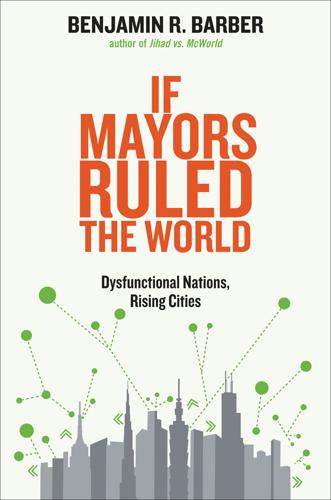
If Mayors Ruled the World: Dysfunctional Nations, Rising Cities
by
Benjamin R. Barber
Published 5 Nov 2013
INDEX Adewale, Ayodele, 210–212 Afghanistan, crime in, 202–203 African-Americans: access to parks, 206, 207; housing integration, 190; in prison, 185 Agenda 21, 158–159 Aging city bailouts, 186–187 Agriculture: and population of cities, 35; and rural society, 64; and urban slums, 191 Air pollution, 130, 206, 382n72. See also Carbon emissions ALEC (American Legislative Exchange Council), 374n7 Alliance in the Alps, 132–133 al Qaeda, 124, 125 Amazon, 254 American Legislative Exchange Council (ALEC), 374n7 Americans for the Arts, 293 Anarchy, 12, 61 Annawadi, 182–183, 201 Antideclinists, 167–168 APAP (Association of Performing Arts Presenters), 290, 293 Apple, 253–256 Arab Spring, 157, 251, 259 Architectural contests, 18 Argentina, economic inequality, 383n2 Artificial naturalism, 35 Arts.
…
Sabrina Tavernise, “As Gas Drilling Spreads, Towns Stand Ground over Control,” New York Times, December 15, 2011. 6. “60% in City Oppose Mayor’s Soda Ban, Poll Finds,” New York Times, August 22, 2012. 7. The influence of private wealth on public decision making is perfectly reflected in the work of the American Legislative Exchange Council, a powerful national lobby masquerading as a nonpartisan tax-deductible charity. ALEC has several thousand state legislators as members and represents more than forty corporations, including Wal-Mart, Coca-Cola, Kraft, Amazon, Johnson & Johnson, and General Motors. Over more than thirty years, ALEC has offered hundreds of “model bills” on policy decisions of interest to them and on the dockets of state legislatures.
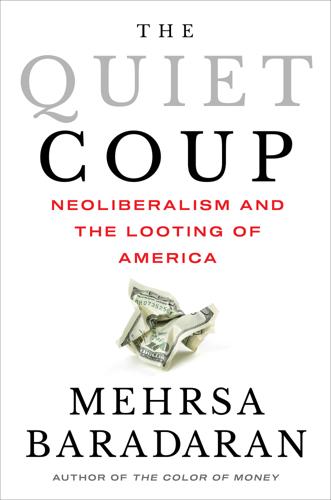
The Quiet Coup: Neoliberalism and the Looting of America
by
Mehrsa Baradaran
Published 7 May 2024
These motivated billionaires were the silent forces propelling the spread of neoliberal theories like shareholder supremacy through the channels of idea dissemination like the academy, think tanks, and media, until they became conventional wisdom. Other think tanks and lobbying groups that formed after the Powell memo included the American Legislative Exchange Council (ALEC) in 1973, the Cato Institute in 1977, and the Manhattan Institute in 1978. Lobbying firms grew from a total of 175 in 1971 to more than 2,500 a decade later (these figures include many groups that were not identified with neoliberalism). Political action committees, organizations that pool financial contributions to support or oppose issues or candidates, increased in number from fewer than 300 to over 1,200.
…
Ban a payday loan and it changes into a title loan; try to impose fee limits and “fees” turn into insurance or “tips.” Walmart, for instance, offers its employees “wage access,” which gives workers a payday loan from their own future wage earnings, but with interest, or rather mandatory “tips,” paid to the lender.31 Thanks to right-wing-funded groups like the American Legislative Exchange Council, statehouses are regularly supplied with form legislation funded and drafted by industry, making it easier to conduct their business in the state. There are no powerful counterlobbies with funds to protect marginalized and politically powerless communities from these laws, which legislatures can pass without controversy.
…
Italian Colors Rest., 210–11 Amazon, 322 AMC Entertainment Holdings, 331, 332 American Bar Association (ABA), 100, 211 American Civil Liberties Union (ACLU), 109 American colonies, 193 “American creed,” 32, 42 American Dilemma, An (Myrdal), 12–13, 32 American dream, xxiii American Enterprise Institute (AEI), 90, 91, 140, 154, 229, 314 American Legislative Exchange Council (ALEC), 91, 92, 214 American Motors, 76 American Republic, The (Berle), 81 American Revolution, 44, 357, 364 Americans for Prosperity, 307 Amini, Mahsa, 357 Anaconda Copper, 55 Anderson, Marian, 217 Anderson, Marty, 370–71 Andreessen Horowitz, 326, 327 angel investors, 363 Anglo-Iranian Oil Company (AIOC), 47 anthropology, 351 antibiotics, 38 anticolonialism, 30, 40, 48, 94–95, 220 anticompetitive behavior, 193 Antifa, xxiii antitrust, 157–58, 234, 239, 323 Antitrust Paradox, The (Bork), 157 antiwar movement, 10, 18, 94, 107 apartheid, 39, 50, 53, 54, 56, 90 Apple, 322 aptitude tests, 116–17.
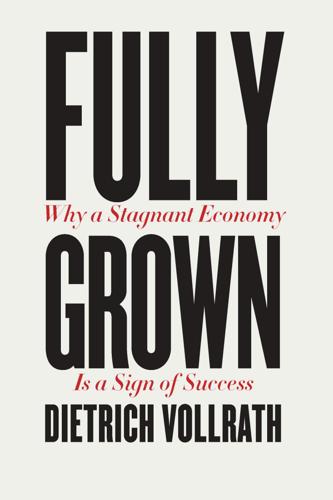
Fully Grown: Why a Stagnant Economy Is a Sign of Success
by
Dietrich Vollrath
Published 6 Jan 2020
The authors also separated regulations into industry-specific (e.g., rules related to treatment of wastewater at a coal plant) and general (e.g., rules governing minimum wage), and looked at whether those general regulations are related to the start-up of firms or the reallocation of workers. Again, they didn’t find anything showing that they were. Consistent with this evidence is data using the American Legislative Exchange Council’s ALEC-Laffer ranking of state competitiveness. ALEC is a think tank and lobbying group that promotes limited government and free markets, according to its own promotional materials. Laffer refers to Arthur Laffer, of the eponymous curve that relates tax revenues to tax rates. ALEC and Laffer combined information on several measures of state economic policies to determine which states are the most competitive.
…
American Economic Review 105 (12): 3531–63. Young, A. 2014. “Structural Transformation, the Mismeasurement of Productivity Growth, and the Cost Disease of Services.” American Economic Review 104 (11): 3635–67. Index accounting profits, 105 agricultural yields, 76 agriculture industry, 5, 85, 88 American Legislative Exchange Council, 175–77, 182, 183, 246 artificial intelligence, 8, 215 baby boom. See demographics Baumol, William, 5, 94–98, 100, 101, 234, 235, 250 Boskin Commission, 74, 254 Canada, 111 China, 9, 19–23, 182. See also trade Clayton Act, 136, 241 commuting zone, 201, 202 concentration: of firms, 105, 121–24, 137, 153, 154; of income, 185 constant returns to scale, 43, 224, 225, 227 construction industry, 74, 85, 165, 167, 181, 182, 209 contraception, 4, 68, 208, 231; birth control pill, 4, 35, 68, 124, 231 copyright, 130, 133 cost disease of services.
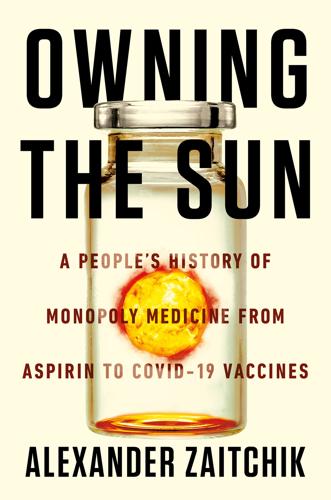
Owning the Sun
by
Alexander Zaitchik
Published 7 Jan 2022
“I think that it is perfectly fine,” he replied. “It is simply an expression of the fact that you cannot please everybody. Now that I am in the private sector, I understand a little bit more about these things.” 38.The campaign anticipated the fifty-statehouse strategy of the corporate-funded American Legislative Exchange Council, founded in 1973 with pharmaceutical industry contributions. 39.In 2010, a Democratic Congress passed a Hatch-Waxman lookalike bill called the Biologics Price Competition and Innovation Act. It replicated the Hatch-Waxman tradeoff, establishing expedited approval for generic biologic drugs in exchange for giving companies new pathways to delay competition and defend market exclusivity, which the bill guarantees for twelve years.
…
INDEX ACT Accelerator, 228–29, 235 Adams, Samuel Hopkins, 38, 39 Adrenaline, 41–42 Adriani, John, 175 AFL-CIO, 80, 177 Africa, 107, 206, 208–209, 212–13, 231, 237, 238, 244, 248, 258 Agricultural Adjustment Administration, 59n Agriculture, Department of, 71, 103, 104, 108 AIDS and HIV, xvii, 114n, 180–89, 206, 207–209, 211–14, 219, 221, 231, 235, 237, 244–46, 254, 258 Alcoa, 61–62, 76 Allen, Frederick I., 37–38 Allen, Joe, 161–62, 164, 166 Alsop, Joseph, 67 Alton, Gregg, 226 American Association for the Advancement of Science, 52 American colonies, 9–10 American Economic Association, 145 American Enterprise Institute, 149 American Legislative Exchange Council, 175n American Medical Association (AMA), 25n, 26, 33, 43, 52, 54, 55, 99, 119–24, 128, 129, 136, 175, 176 American Patent Law Association, 67–68 American Pharmaceutical Association, 26, 33, 36, 43 American Radio and Research Corporation, 77–78 American Society for Pharmacology and Experimental Therapeutics, 20–21 Amin, Tahir, 181 amphetamines, 98, 129 Ancker-Johnson, Betsy, 159 antibiotics, xvi–xvii, 93, 95–97, 106–108, 171; penicillin, 75, 101–11, 125, 131, 191, 195, 196, 258; streptomycin, 106, 191; tetracycline, 106, 130, 196 Antitrust Project, 142–45 Argentina, 207–208 Arnold, Thurman, 62–68, 80–81, 94, 121, 141, 145 Asclepius, 22–23 Aspirin, 33–39, 42, 93, 127n, 173 AstraZeneca, 180, 181, 222, 227, 234 AT&T, 85, 95 Austrian School, 139–41, 143 Azar, Alex, 223 AZT, 184–89, 206 Baker, Brook, 237–38 Bale, Harvey, 204n, 236 Bancel, Stéphane, 253 barbiturates, 126–27, 130 Barnett, Gerald, 51 Barnum, P.
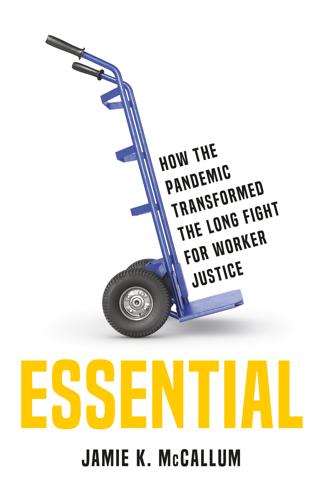
Essential: How the Pandemic Transformed the Long Fight for Worker Justice
by
Jamie K. McCallum
Published 15 Nov 2022
Low-wage work has been mandated by the American business class and its allies in government. To call it a conspiracy isn’t far off. In the wake of the Great Recession, a fierce new movement emerged to challenge public sector unions, where the largest percentage of union members are today. Led by corporate-backed organizations like the American Legislative Exchange Council (ALEC), and emboldened by Republican electoral victories in the 2010 midterm elections, this movement struck out to transform American labor law. In 2011 and 2012, fifteen states passed laws that restricted the rights of public employees to collectively bargain. During the same time, nineteen states introduced “right-to-work” laws that try to bankrupt unions by prohibiting them from collecting dues from all workers covered by their contracts.9 The decline of worker voice and poverty wages at the bottom of the labor market are compounded by other factors that make for miserable jobs across industries.
…
The protestors quickly attracted widespread media coverage as well as support from powerful right-wing lobbyists. The demonstrations’ impact was grossly magnified, and reshaped national politics. The Save Our Country Coalition—a network of conservative think tanks including FreedomWorks, the Tea Party Patriots, and the American Legislative Exchange Council—was just one of the billionaire-backed drivers of these protests. Still, authentic anti-elite politics filtered into the workplace during the pandemic. Searing critiques of pandemic profiteering, the comparable safety of the telecommuting crowd, and the deplorable conditions under which essential workers toiled created a kind of workplace populism.
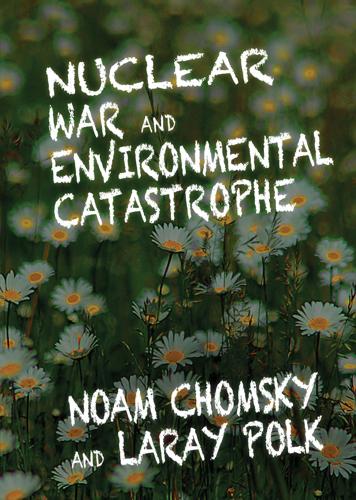
Nuclear War and Environmental Catastrophe
by
Noam Chomsky
and
Laray Polk
Published 29 Apr 2013
John Donnelly, “Price Rise and New Deep-Water Technology Opened Up Offshore Drilling,” Boston Globe, December 11, 2005; Mark Finley, “The Oil Market to 2030—Implications for Investment and Policy,” Economics of Energy & Environmental Policy 1, no. 1 (2012): 28, doi:10.5547/2160-5890.1.1.4. 3 Christian Parenti, Tropic of Chaos: Climate Change and the New Geography of Violence (New York: Nation Books, 2011), 226. Abbreviations ACHRE: Advisory Committee on Human Radiation Experiments AEC: Atomic Energy Commission ALEC: American Legislative Exchange Council API: American Petroleum Institute ARPA-E: Advanced Research Projects Agency-Energy BIOT: British Indian Ocean Territory BLEEX: Berkeley Lower Extremity Exoskeleton BP: British Petroleum CDB: China Development Bank CIA: Central Intelligence Agency CND: Campaign for Nuclear Disarmament COP: Conference of the Parties to the UNFCCC CTBT: Comprehensive Test Ban Treaty CW: chemical weapons DARPA: Defense Advanced Research Projects Agency DEFCON: defense readiness condition DOD: Department of Defense DOE: Department of Energy DU: depleted uranium EPA: Environmental Protection Agency GE: General Electric HEU: highly enriched uranium IAEA: International Atomic Energy Agency IBM: International Business Machines ISN: Institute for Soldier Nanotechnologies IT: Information Technology LEU: low-enriched uranium MAD: mutually assured destruction MIT: Massachusetts Institute of Technology NAM: Non-Aligned Movement NATO: North Atlantic Treaty Organization NAVSTAR GPS: navigation system for timing and ranging, Global Positioning System NEPA: National Environmental Policy Act NIH: National Institutes of Health NNI: National Nanotechnology Initiative NPT: Non-Proliferation Treaty NSC: National Security Council NSF: National Science Foundation NSG: Nuclear Suppliers Group NWFZ: nuclear-weapon-free zone OPEC: Organization of the Petroleum Exporting Countries OSRD: Office of Scientific Research and Development PNE: peaceful nuclear explosion POW: prisoner of war PTBT: Partial Test Ban Treaty R&D: research and development RADAR: radio detection and ranging SDS: Students for a Democratic Society START: Strategic Arms Reduction Treaty TRIPS: Trade-Related Aspects of Intellectual Property Rights UN: United Nations UNFCCC: UN Framework on Convention on Climate Change WgU: weapon-grade uranium WTO: World Trade Organization 1.
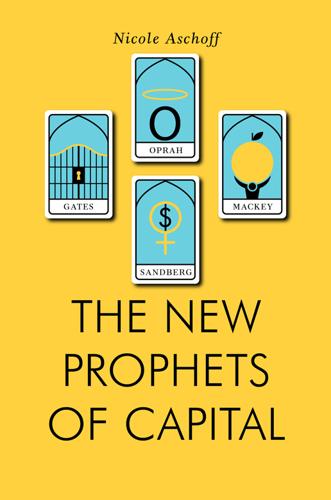
The New Prophets of Capital
by
Nicole Aschoff
Published 10 Mar 2015
The response by parents, students, and communities is building, but they face an uphill battle, because despite their frustration and anger they have little say in the education reform process. The Gates Foundation is a private institution that is free to use its money as it sees fit. It’s not just Bill and Medinda Gates. Education reformers lobby Congress to pass legislation written by the American Legislative Exchange Council, an organization of conservative legislators and business groups that writes sample legislation for political representatives to present to Congress and state legislatures. When Mark Zuckerberg decided to donate $100 million to “fix” the Newark Public School System, the foundation board established to decide how to use the money had only a single community member on it—(former) Mayor Cory Booker.48 Foundations are not only unaccountable and undemocratic—they often also implement programs and structures that are undemocratic.
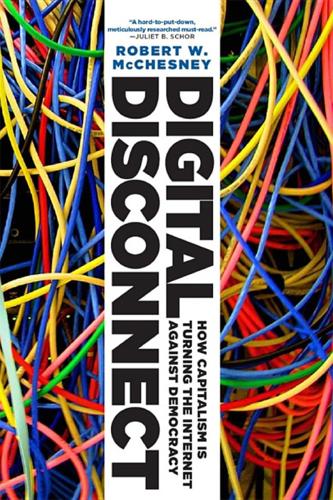
Digital Disconnect: How Capitalism Is Turning the Internet Against Democracy
by
Robert W. McChesney
Published 5 Mar 2013
“What’s a nonprofit digital news operation? Consumer Reports online?” asks Newton. “The highly ethical digital info gathering part of Human Rights Watch?”126 In 2011, for example, the Center for Media and Democracy (CMD) produced award-winning exposés of the secretive and corporate-dominated American Legislative Exchange Council (ALEC). A few years earlier, the work might have been done by traditional journalists, but there were simply too few left to take on that assignment. As exciting as it is to have NGOs get into the journalism business, we should not romanticize the development and make a virtue out of a necessity.
…
See corporate acquisitions Acxiom, 265n125 Adams, John, 57, 243n100 addiction, 10, 11, 45 Advance Publications, 177 advertising, 20, 41–46, 52–53, 58–59, 75, 123, 154–58, 185 Jerry Mander on, 240–41n65 on mobile apps, 148 tax break for, 78 Twitter stance on, 153 See also broadcast advertising; Internet advertising; newspaper advertising; personalized advertising advertising and marketing to children, 76–77, 216, 247n46, 266n151 advertising-free media, 211–14 advertising regulation, 93, 146, 216 Africa, 2, 8, 163 agriculture, 25, 70–71 Alabama, 177 Alden Global Capital, 185 Alinsky, Saul, 220 alphabet, 71 Alterman, Eric, 272n25 Amazon, 127–28, 131, 136–37, 138, 140, 142, 193 American Civil Liberties Union (ACLU), 165, 167, 270n238 American Legislative Exchange Council (ALEC), 198 America Online. See AOL ancient Greece, 71 Anderson, Chris, 101, 132, 141, 143 Andrews, Lori, 142, 149 Android, 133, 134, 150 Anti-Counterfeiting Trade Agreement (ACTA), 125–26 antiterrorism, 160–62, 170 antitrust regulation, 142, 143 AOL, 103, 111, 123–24, 137, 149, 189, 191 Apple, 28, 32, 101, 108, 127–28, 131, 137, 139, 140 cloud computing, 136 government relations, 142 monopolistic enterprises, 138 patents, 134, 260n25 proprietary platforms, 135 tax evasion, 145 Apple iPad, 131, 187 Apple iPhone, 135, 150 Apple iTunes, 127, 131 apps, mobile.
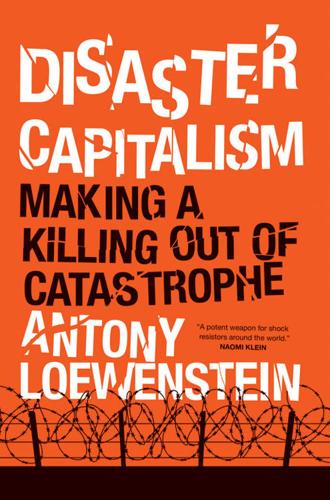
Disaster Capitalism: Making a Killing Out of Catastrophe
by
Antony Loewenstein
Published 1 Sep 2015
“They leave the most expensive prisoners with taxpayers and take the easy prisoners.”22 This left an army of mentally ill inmates rotting away in state-run prisons that were often in worse shape than when they had arrived, according to a 2014 report by the Treatment Advocacy Center.23 According to a 2012 study by the same organization, 356,000 mentally disturbed people were held in prisons nationwide, while only 35,000 were housed in psychiatric facilities.24 This is how it worked. The American Legislative Exchange Council (ALEC) was a body that brought together conservative legislators and the private sector to draft market-friendly policies around the country. In Arizona, ALEC routinely indulged politicians making decisions about immigration policy with parties and exclusive access to sports events—and yet the politicians only needed to disclose that they had attended an ALEC conference.
…
Index Abbott, Tony 279, 286 Abdul (asylum seeker) 286 Abu Ghraib prison 15 abuse 258–62 aid 123 child 102 drug 37–9 human rights 110 labor 29 outsourced 260–1 in prisons 216–17, 218 sexual 252–8, 280–1 accountability 16, 30–1, 180, 277, 291, 310 Adam, Harry 118 AECOM 53–4 Aegis Defence Services 33 Afghan Institute for Strategic Studies 44 Afghanistan 12, 19–56, 59–63, 117, 175 arrival of PMCs 20 asylum seekers from 69–70 Australian contractors 60 casualties 32, 326n27 Chinese support for 37 contractors 28–31 corruption 22, 24, 27, 42, 45, 328n48, 329–30n58 counterinsurgency 43, 52–3 departure of foreign troops 62–3 dependence on America 45 development support 62–3, 324n2, 324n3 drug economy 37–9 election, 2004 31–2 election, 2009 32 election, 2014 32 entrepreneurs 56 fear of resurgent Taliban 44–5 financial situation 62–3 future of PMCs in 23 GDP 330n61 human rights 42 inequality 56 insurgency 12, 32 intelligence gathering 51–6 intelligence-sharing nations 21 invasion of 20, 31 labor abuses 29 laws against PMCs 21 locals’ view of 48 mineral rights 24, 330n65 mining industry 24, 49–50, 330n65 Ministry of Interior 21, 40–2 Ministry of Mines 50 natural resources 49 night raids 43, 46, 52, 54, 55, 328–9n50 occupation of 22, 31–5, 36, 43, 44, 52–3, 63, 325n10 official line 40–3 past conflicts 36–7 PMC numbers 20 population surveys 330–1n66 private military companies 16, 19–25, 33–5, 41–3, 44, 46–8, 48, 50, 59–62, 331n69 propaganda 26 reconstruction 325n11 resource exploitation 49–50 security forces 27, 330n61 Soviet invasion 37 suicide attacks 41 suicide rates 332n83 Taliban rule 25 translators 55, 325n19 USAID 327–28n46 US military bases 28 violence 20 war economy 25–31, 38, 63 warlords 32–3, 44, 326n28, 326–7n30 women in 44, 47–8, 48–9, 50–1, 330n59 Afghanistan Analysts Network 54–6, 328–9n50 Afghanistan Reconstruction Group 26 Afghan police force 27 Afghan Public Protection Force 21 Africa 23 African-Americans, incarceration rates 195, 196 Agility Logistics 124 aid Afghanistan 62–3 Australia 50 contracts 123–5 corruption 126, 171 criticism of process 144–7 food 145–6 fraud 123–4 Haiti 12, 108, 120, 144–7, 340n56, 342n89 human rights abuses 123 NGO-ization of 137–41 Papua New Guinea 13, 158–9, 167, 171–5, 179 profiteering 139 waste 146 aid dependency 121, 126 AIDS 89 Alexander, Michelle 195–6 Alex, Commander 156–7 Al-Hussein, Zeid Ra’ad 277 Al Jazeera America 29 American Correctional Association (ACA) conference, 2014 202–11 American Legislative Exchange Council (ALEC) 201 American University of Afghanistan 43–4 Amnesty International 259 Anastasiou, Vassilis 102 Anti-Defamation League 93 anti-fascist activism 93–4 anti-Semitism 90–1, 93 Arab Spring 97, 127–8 Arawa, Papua New Guinea 158, 167, 180–4 Aristide, Jean-Bertrand 26, 112–13, 151 Arizona 200–2 AshBritt 108 Ashton, Paul 201 assassinations 323n33, 331n69 Assessing Progress in Haiti Act (US) 124 Asylum Help 234 asylum seekers abuse 258–62 austerity 69 Australia 269–305 children 249–50 closed hospitality centers 67–8 costs 304 demonization of 77, 288 deportations 258–63 destinations 68 detention centers 13, 64–71, 76, 77–80, 230–5, 245–51, 271 detention costs 281–3 detention network privatization 77 Greece 64–71, 75–7, 77–80, 89 indefinite detention 68 lack of sympathy for 287–8 medical care 77–80, 256–8 mental health 254–5, 285, 286, 295, 302 motivation 68, 302–3 numbers reaching Europe 96 privatized housing 230–5 processing times 300–1 public sympathy 271 racist violence 71 reception centers 67 refugee crisis 95–8 self-harm 295–6 sexual abuse 280–1 Syntagma Square protest, 2014 70 United Kingdom 230–5, 244, 245–51, 252–8, 258–63 women 253–4 Athens 67, 102–3 Metropolitan Community Clinic 80–4 AusAID 158–9, 161, 171–5, 182, 189–91, 331–2n77 austerity, opposition to 72–5 Austin American-Statesman 108 Australasian Centre for Corporate Responsibility 190 Australasian Correctional Management (ACM) 282 Australia 8, 104 and Afghanistan 50 aid 50 asylum policy development 275–85, 286, 357n4, 357n9 asylum seeker network 269–305 asylum seekers 13 Community Assistance Program 304 complicity with BCL 160 Department of Immigration and Border Protection (DIBP) 271, 274, 279, 281–2, 284,286, 289–93, 295, 297–8, 300–1, 303 detention centers 13, 271, 274, 276, 278–9, 280–5, 285–305, 356n2, 357n11 detention costs 281–3 economic reforms 322n16 exploitation of Papua New Guinea 169–75 foreign policy 173–4 goals in PNG 172 immigration policy 278 “Mining for Development” initiative 190 the Pacific Solution 276–81 and Papua New Guinea 154, 160, 163, 167, 169–75, 176–7, 179, 188–91 PMC contractors 60 privatization 361n51 and Rio Tinto 162 state-ownership approach to resources 177 tender process 289–90 turnback policy 280, 286 Australian Mercy 285 Australian Navy 276 Australian Strategic Policy Institute 190 Autonomous Bougainville Government 161, 167, 178–80, 184, 346n33 Avera eCare 205 Avon Protection 203 Bagram prison 31 Bainimarama, Frank 346–7n41 Baker, Charles 117 Baldry, Eileen 285 Balkonis, Thomas 78–80 Bamazon (TV program) 306–7 Bangladesh 341n65 bank bailouts 3 bankers bonuses 4 Ban Ki-moon 113 Bank of America 3 Barnardo’s 249–50, 266 Barrick Gold 174 Batay Ouvriye 126 Bauer, Shane 204, 207–8, 210 bearing witness 9–10 Becket House, London 263 Bedford, Yarl’s Wood detention centre 252–8, 265 Behavioral International 227 Berati, Reza, murder of 283 Berghorn, George H. 204 Berman, Steve 187 BHP Billiton 172–3, 187, 189 Bigio, Gilbert 108 Bill and Melinda Gates Foundation 114 Bishop, Julie 176, 182 black sites 16 Blackwater 16, 35, 59, 323–4n40, 331n69 Blair, Tony 60, 236 Blanchard, Olivier 99 bloggers 308 Bloom, Devin D. 307 Blue Mountain Group 30 Boeing 15–16 Bolivia 26, 125 Booz Allen Hamilton 15 border controls, privatization 241 Bougainville Copper Limited (BCL) 159, 159–61, 162, 163, 184–6, 188, 190, 343n6 Bougainville, Papua New Guinea 154–64, 167–9, 176, 178–80, 184–5 Bougainville Revolutionary Army (BRA) 154–5, 163–4, 176, 343n6 Bougainville Women in Mining 183–4 Bozorg (asylum seeker) 232–3 Brand, Russell 267–8 bribery 22, 38, 41, 329–30n58 Brown, Bob 174 Brown, Michael, killing 203 Buckles, Nick 283 Burma 14 Bush, George W. 7, 25, 43, 118, 149 Cable, Vince 236 CACI 15–16 California 5, 196–7, 208 Callick, Rowan 176 Call Sense 210 Cambodia 276 Cameron, David 50, 62, 243, 244, 252, 263 Campbell, Chad 201 Campbell, David 284, 359n30 Campsfield detention facility 246–9, 266–7 Canada 120, 304 Capita 241–2 Capital in the Twenty-First Century (Piketty) 6 capitalism 1–2 critiques 361n5 disaster 6–9 Klein’s critique of 7–8 predatory 11, 13–14, 162, 310–11 unregulated 135–6 Caracol industrial park, Haiti 116, 128–33, 133–6, 148 Carol (senior analyst) 54–6 Carr, Bob 188–9 Cash, Linda 279 Centre for Economic and Policy Research (CEPR) 124–5 Centre for Public Integrity 34 Chalmers, Camille 151–2 Chaman (Afghan refugee) 64–71 Channel 4 News 253, 267 Chaparro, Enrique Mari 137–9 cheap labor 117, 127, 132, 133, 144 Chemonics 123 Cheney, Dick 28, 30 CHF International 138–9 child abuse 102 children detention 249–50, 272 immigrants 212, 225 malnourished 82 in prisons 208 child slaves 145 China 14, 16, 24, 37, 49, 170 China Metallurgical Group Corporation (MCC) 24 cholera 113–16 Chomsky, Noam 238, 310 Christmas Island 269–75, 356n1 Christmas Island Community Reference Group 356–7n3 Christmas Island detention facility 271, 272–3, 274, 276, 278–9, 285–9, 299–305, 356n2 Chrysohoidis, Michalis 67–8 CIA 15, 59, 110, 331n69, 331n73 Citizens for a Free Kuwait 25 City AM (newspaper) 236–7 civilian casualties, Afghanistan 32 Clarke, Victoria 26 Clayton Homes 118 climate change 1–2, 8 Clinton, Bill 116, 118–19, 122, 123, 135 Clinton Foundation 118, 126, 136 Clinton, Hillary 8, 30, 118, 125, 131, 135, 171 Clive (information management consultant) 51–2 Clive (Serco contractor) 289–92 Coffey International 162 Colas, Landry 131 Cold War 33, 111 Collective Against Mining 121 colonialism 109, 160 Comcast 5 Commission on Wartime Contracting (US) 34 Community Assistance Program, Australia 304 community mapping 58 Conflict Mapping in Afghanistan since 1978 (Independent Human Rights Commission) 32 Congo, Democratic Republic of 120 contractors, Afghanistan 28–31 Conway, Jim 208–9 copper mining, ecological damage of 173 Corcoran, Thomas J. 110–11 Corinth detention centre 64, 78–80 Corizon 209 corporate ideology 14 corporate power 7 Corporate Responsibility Coalition 187–8 Corporate Watch 255, 263 CorrectHealth 199 Corrections Corporation of America (CCA) 13, 197–8, 199, 201–2, 211–22, 227, 228, 284–5 corruption Afghanistan 24, 27, 42, 45, 328n48, 329–30n58 aid 126, 171 Greece 64, 72 Haiti 141 overcharging 240–1 Papua New Guinea 170, 171, 188 price-gouging 292 counternarcotics information campaign 26 Crocker, Ryan C. 43 Crockett, Greg 204–5 Crossbar 204–5 Cuba 122 cultural sensitivity 21 Daily Mail 235 Daily Telegraph (Sydney newspaper) 172 Damana, Chris 184–5 Das, Satyajit 309 Daveona, Lawrence 177–8 David (Serco source) 292 Davis, Raymond 57, 331n73 Davis, Troy 199 Davos conference, 2015 2–3 debtocracies 99 Defence Logistics Agency 29 democracy 16, 311 Democracy Now!
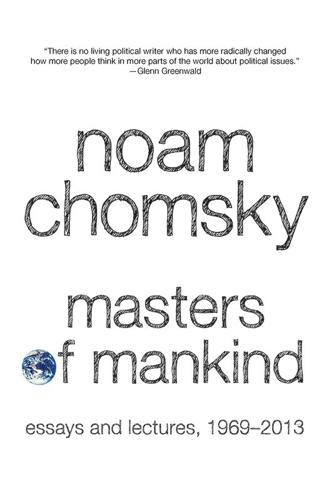
Masters of Mankind
by
Noam Chomsky
Published 1 Sep 2014
These majorities were maintained between 2006 and 2010 and shrank somewhat after that.8 The fact that the public is influenced by science is deeply troubling to those who dominate the economy and state policy. One current illustration of their concern is the Environmental Literacy Improvement Act being proposed to legislatures by ALEC, the American Legislative Exchange Council, a corporate-funded lobby that designs legislation to serve the needs of the corporate sector and extreme wealth. The ALEC act mandates “balanced” teaching of climate science in K–12 classrooms. “Balanced teaching” is a code phrase that refers to teaching climate-change denial in order to “balance” mainstream climate science.
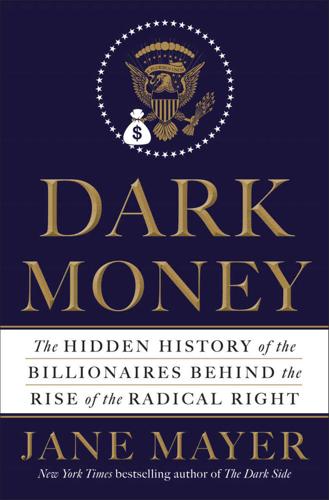
Dark Money: The Hidden History of the Billionaires Behind the Rise of the Radical Right
by
Jane Mayer
Published 19 Jan 2016
“We are basically a conduit to and from the Heritage Foundation to and from conservative members of the House,” its director, Don Eberly, said in 1983. Weyrich, with Scaife’s financial backing, launched several other ingenious political organizations during this period. One was the American Legislative Exchange Council (ALEC), a group aimed at waging conservative fights in every state legislature in the country. From 1973 until 1983, the Scaife and Mellon family trusts donated half a million dollars to ALEC, constituting most of its budget. “ALEC is well on its way to fulfilling the dream of those who started the organization,” a Weyrich aide wrote to Scaife’s top adviser in 1976, “thanks wholly to your confidence and the tremendous generosity of the Scaife Family Charitable Trusts.”
…
Coordinating with the think tanks were over a hundred “associate” members that included conservative nonprofit groups like Americans for Prosperity, the Cato Institute, the Heritage Foundation, and Grover Norquist’s Americans for Tax Reform, which the Kochs also helped to fund. Adding clout to the Right’s reach at the state level was the American Legislative Exchange Council. Weyrich’s brainchild had grown impressively since the 1970s, when Richard Mellon Scaife had provided most of its start-up funding. Critics called it a conservative corporate “bill mill.” Thousands of businesses and trade groups paid expensive dues to attend closed-door conferences with local officials during which they drafted model legislation that state legislators subsequently introduced as their own.
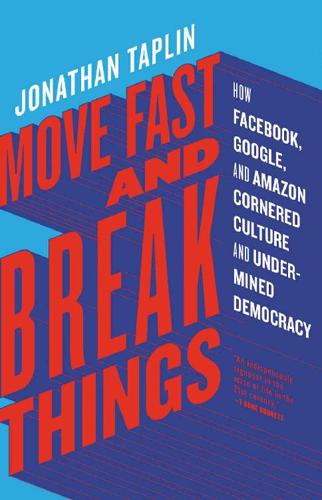
Move Fast and Break Things: How Facebook, Google, and Amazon Cornered Culture and Undermined Democracy
by
Jonathan Taplin
Published 17 Apr 2017
Jane Mayer quotes public-relations expert Fraser Seitel about the Koch brothers’ effort to remake their image: “They’re waging a charm offensive to reset the image of the Kochs from bogeymen shrouded in secrecy to philanthropists who are supporting black colleges and indigent defense.” By 2013 both Google and Facebook followed Koch Industries and joined the American Legislative Exchange Council (ALEC). Founded in 1973 as the Conservative Caucus of State Legislators, ALEC states that its current goal is to further “the fundamental principles of limited government, free markets, and federalism.” ALEC is the principal climate-change opposition group at the state level, but it also has focused on “opposing insurance coverage for birth control in the US; opposing the individual health insurance mandate enacted by the Affordable Care Act; expanding the ‘Stand Your Ground’ laws that allow citizens the right to self-defense if they feel their property is under attack; prohibiting cities from building public broadband networks; urging state legislatures to demand voters produce state-issued IDs.”

Reaganland: America's Right Turn 1976-1980
by
Rick Perlstein
Published 17 Aug 2020
A Palos Verdes life insurance executive was quoted offering a typical response from the state’s middle class: “It’s time to bring those cotton-picking legislators down to their knees.” * * * AT THE END OF MAY in the Chicago suburb of Lincolnshire, with the vote in California a week way, two hundred activists met at a National Tax Limitation Conference. An aide for one of sponsors, the American Legislative Exchange Council, an organization controlled by Paul Weyrich that wrote conservative “model legislation” for state legislators to introduce, described tax limitation as the perfect issue to build a broader conservative movement—to organize discontent: “It crosses all philosophies. Everybody is concerned with the increase in taxes.”
…
The Institute for Educational Affairs, established the previous year by William Simon and Irving Kristol with gifts of $100,000 each from Bechtel, Coca-Cola, Dow Chemical, Mobil, and Nestlé, began distributing grants to promising conservative undergraduates and PhD candidates, and subsidized conservatives to take otherwise unpaid internships at activist organizations, periodicals—and even unsuspecting federal agencies. Organizations for grown-ups were thriving, too—like the American Legislative Exchange Council, which, along with what New Right Report called a “coalition of pro-life, pro-Right-to-Work, pro-Defense, pro-gun, pro-free-enterprise, pro-balanced-budget, pro-tax-limitation, pro-farmer, and anti-left activists,” helped crush a constitutional amendment granting statehood to the heavily Democratic District of Columbia.
…
experts’ bluff Ibid., 73. “Save the American Dream” KTLA, May 31, UCLA Film and Television Archive, YouTube.com, accessed April 2, 2020. “cotton-picking legislators” “Homeowners Get Tax News, Vow to Back Prop. 13,” LAT, May 19, 1978. Tax Limitation Conference AP, May 22, 1978. American Legislative Exchange Council Dan Kaufman, The Fall of Wisconsin: The Conservative Conquest of a Progressive Bastion and the Future of American Politics (New York: W.W. Norton, 2018), 133–34. Newsweek agreed “The Great Tax Revolt,” Newsweek, June 19, 1978. “The damn thing” William Safire column, February 27, 1979.
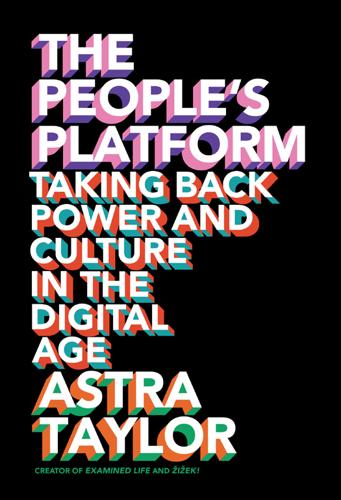
The People's Platform: Taking Back Power and Culture in the Digital Age
by
Astra Taylor
Published 4 Mar 2014
See Charles Duhigg and David Barboza, “In China, Human Costs Are Built into an iPad,” New York Times, January 25, 2012; and Spencer Soper, “Inside Amazon’s Warehouse,” Morning Call, September 18, 2011. All the tech giants are getting in on the lobbying game, but for one particularly controversial initiative, consider the Facebook-led lobbying group FWD.us. In 2013, Google, Facebook, and Yelp all joined ALEC, the American Legislative Exchange Council—a lobbying organization notorious for supporting climate change denial, undermining gun control, and busting unions—even as companies including Kraft Foods and Pepsi left due to consumer pressure. 1: A PEASANT’S KINGDOM 1. For the 450,000 jobs figure, see Sarah Lacy, Once You’re Lucky, Twice You’re Good: The Rebirth of Silicon Valley and the Rise of Web 2.0 (New York: Gotham, 2008), 13.

That Wild Country: An Epic Journey Through the Past, Present, and Future of America's Public Lands
by
Mark Kenyon
Published 2 Dec 2019
These types of anti-public-land bills were notable, despite their similarity to the failed movements in prior decades, because they had disproportionately deep pockets funding the cause. Much of the energy, lobbying, and funding for land-transfer legislation and proposals over the past few years can be traced back to two organizations—the American Lands Council and the American Legislative Exchange Council. The ALC, founded by Rep. Ken Ivory of Utah, was the primary lobbying group supporting land transfers across the country, while the ALEC was responsible for drafting the majority of the model state-level legislation that ended up passing in state capitols across the West. Both of these organizations received funding from the famed Koch brothers and a variety of mining and fossil fuel industry interest groups and corporations.

The Boy Who Could Change the World: The Writings of Aaron Swartz
by
Aaron Swartz
and
Lawrence Lessig
Published 5 Jan 2016
Lee Liberman Otis was just a law student when she started pitching Scaife and others on the need for the Federalist Society.† The field even has its serial entrepreneurs. Paul Weyrich was the press secretary for a Republican senator when he met Joseph Coors. Over the next few decades, Weyrich used Coors’ money to start the Heritage Foundation, the Free Congress Foundation, Moral Majority, the American Legislative Exchange Council, and various other groups that haunt any history of modern conservatism’s rise. Just like the vendors at the inauguration, political entrepreneurs sought out people with money and tried to sell them something they didn’t even know they wanted. (Manne to Goodrich: “The Augean stables were cleaned by diverting a stream of water through them. . . .
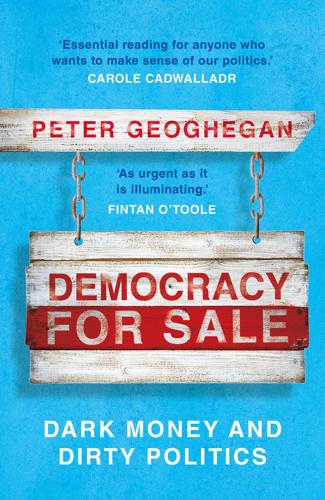
Democracy for Sale: Dark Money and Dirty Politics
by
Peter Geoghegan
Published 2 Jan 2020
The reporter’s description of Fox as “almost the Donald Rumsfeld of Great Britain”21 was more accurate than he might have realised, at least in terms of Fox’s aspirations: at the time, the shadow defence secretary’s Westminster office was decorated with a detailed map of Afghanistan and a photograph of himself with President Bush. Fox’s transatlantic relationships were not merely personal. In 2007, Atlantic Bridge established a “special partnership” with the American Legislative Exchange Council, one of the most influential forces in US conservative politics. ALEC, whose funders have included the Kochs, the Philip Morris tobacco conglomerate, ExxonMobil and the National Rifle Association, is famous for aggressively lobbying state legislators to adopt corporate-backed policies.

When It All Burns: Fighting Fire in a Transformed World
by
Jordan Thomas
Published 27 May 2025
In those same years, climate change denial spread among the U.S. public, the federal government failed to pass any substantial climate legislation, and fossil fuel corporations claimed record profits. Even as corporations’ rampant climate change denial makes working conditions more dangerous, these same corporations endeavor to eliminate workers’ rights. In the past several decades, the American Legislative Exchange Council—a Koch-funded group that drafts state legislation—has passed policies that ban local governments from setting their own wage laws, ban cities from setting decarbonization goals, cripple collective bargaining power, and fight guaranteed access to health care. Similar corporate groups also fund the elections of officials who adhere to the mantra that the role of the government should be to get out of the way of corporate interests.
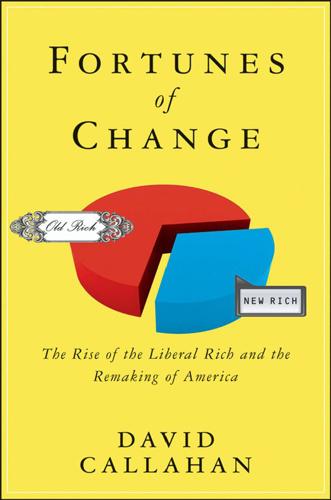
Fortunes of Change: The Rise of the Liberal Rich and the Remaking of America
by
David Callahan
Published 9 Aug 2010
“The strategic piece of the puzzle we’d been missing— consistent across almost every legislature we examined—is that it’s often just a handful of people, two or three, who introduce the most outrageous legislation and force the rest of their colleagues to vote on it,” Gill told the Atlantic in 2007. “If you could reach these few people or neutralize them by flipping the chamber to leaders who would block bad legislation, you’d have a dramatic effect.” Going back to the early 1980s, right-wing groups such as the American Legislative Exchange Council had spent tens of millions of dollars to elect Republicans at the state level, and those investments had yielded enormous dividends. Not only did the right exercise huge influence in state legislatures, but it used this arena to nurture a farm team of young pols, and many stars of the movement—such as Rick Santorum—started their political careers in backwater state capitals.
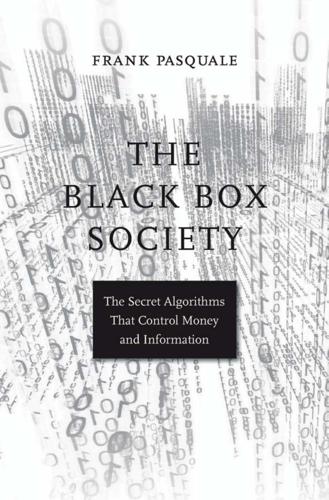
The Black Box Society: The Secret Algorithms That Control Money and Information
by
Frank Pasquale
Published 17 Nov 2014
If a would-be Sinclair tried to document today’s food horror stories, there’s a good chance he’d be fi ned, jailed, or even labeled a terrorist. In Iowa, Utah, and Missouri, undercover investigations of factory farms are illegal. Nearly every major agricultural state has proposed similar legislation. A shadowy corporate-government partnership known as the American Legislative Exchange Council (ALEC) has proposed “The Animal and Ecological Terrorism Act” to deter filming that is designed to “defame” such facilities or their owners.176 Any violators would end up on a “terrorist registry.” Good luck fi nding out exactly how ALEC came to propose that law: a Washington Post reporter who tried to attend a gathering found that its “business meetings are not open.”177 Police escorted him away, and if he had persisted, who knows—maybe he’d have been labeled a terrorist, too.
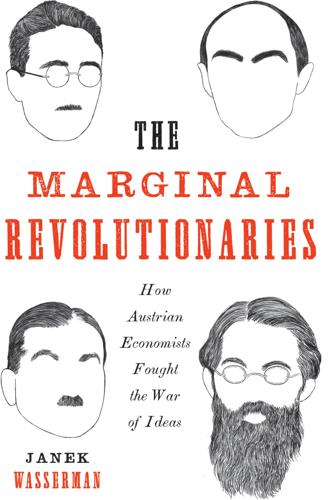
The Marginal Revolutionaries: How Austrian Economists Fought the War of Ideas
by
Janek Wasserman
Published 23 Sep 2019
The future of civilization may really depend on whether we can catch the ear of a large enough part of the upcoming generation of intellectuals all over the world fast enough.” Today the renamed Atlas Network consists of more than 480 think tanks, including the Michigan-based Acton Institute, which offers religious arguments for libertarian policies; AEI; the American Legislative Exchange Council (ALEC), which produces model legislation for conservative US politicians; Americans for Prosperity; the Ayn Rand Institute; Cato; FEE; Heritage; the Hoover Institution; IHS; the Liberty Fund; the Manhattan Institute; Mercatus; and a half dozen Mises Institutes.46 Of course, neither Hayek nor the Austrian School was primarily responsible for IEA’s or Atlas’s roles in the sharp rightward turn in Western politics after 1973.

The Controlled Demolition of the American Empire
by
Jeff Berwick
and
Charlie Robinson
Published 14 Apr 2020
Energy Transfer Partners is the hated company behind the very controversial Dakota Access Pipeline, and they have been accused of using their money to fund lobbying to change the laws surrounding protesting because so many people have protested against their project. Rather than adjust their project, talk with the protestors, or bribe officials to push their proposal through, they instead hired the American Legislative Exchange Council (ALEC) to lobby for measures to increase the length of prison sentences for protests related to “critical infrastructure”. They have made a decision that if they cannot win an argument with the people that disagree with their pipeline, they will just try to criminalize free speech and make sure that the laws put those people that are protesting them in prison for long stretches of time.
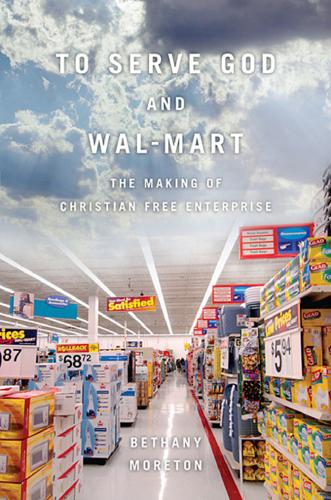
To Serve God and Wal-Mart: The Making of Christian Free Enterprise
by
Bethany Moreton
Published 15 May 2009
As liability insurance premiums grew by as much as 500 percent, liability reformers could look for federal support from the Reagan administration’s Tort Policy Working Group and from their number-Â�one conÂ�gresÂ�sional champion, Senator John Danforth, a Missouri Republican. But much of the fight would take place in the states.64 Concerned, the chemical companies joined a coalition under the auspices of the American Legislative Exchange Council and set out to generate a citizen outcry against tort abuse.65 It was an uphill battle, but as the SIFE competition demonstrated, Dow and the industry group Chemical Manufacturers Association had a valuable asset in Mrs. Nute, wife of Dow lobbyist Leslie F. “Lee” Nute. At an association meeting, Mrs.
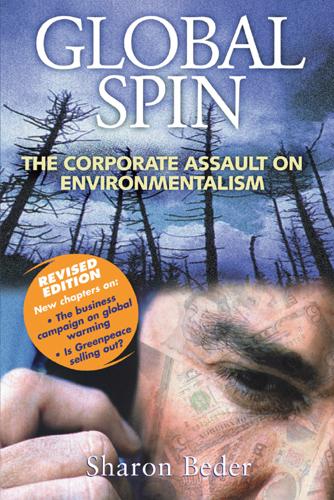
Global Spin: The Corporate Assault on Environmentalism
by
Sharon Beder
Published 1 Jan 1997
He sued for the loss in real estate value of his property when the Coastal Commission changed their management plan so as “to prevent development on sensitive coastal land”. 76 It is claimed that “almost all of the ‘takings’ bills that have been proposed in state legislatures around the county are written by a little right-wing think-tank, the American Legislative Exchange Council, funded by the usual long-lived cast of conservative businesses and foundations.”77 The Council is aiming to introduce stronger takings laws in various states with its model takings legislation, which gives property owners automatic compensation if the value of their land is diminished by fifty per cent or more by government regulations or plans.

Evil Geniuses: The Unmaking of America: A Recent History
by
Kurt Andersen
Published 14 Sep 2020
In the 1980s the Koch groups started producing papers and articles and advertisements arguing the Koch line—against labor unions, against expanded Medicare and Medicaid, against the findings of climate science about global warming. And actually writing laws. They helped underwrite and build the American Legislative Exchange Council, a very effective organization that drafts right-wing bills in Washington for right-wing state legislators to introduce and get their states to enact. Although ALEC is ostensibly an association of elected officials, its operations have been funded almost entirely by members of the Business Roundtable and other big corporations.
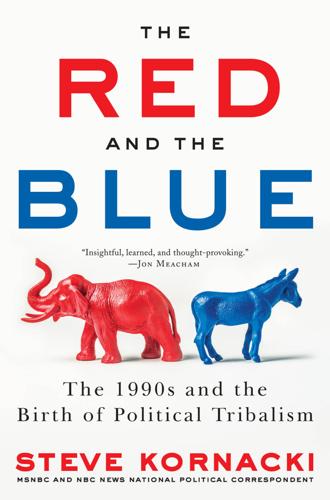
The Red and the Blue: The 1990s and the Birth of Political Tribalism
by
Steve Kornacki
Published 1 Oct 2018
The New York Times: “Aggressive Republicans Choose House Whip,” New York Times, March 23, 1989. “Suffering through”: Ross Baker, “Gingrich As Whip Shows GOP Desperation,” Los Angeles Times, March 31, 1989. While making sure: Michael Kranish, “Conservative Gingrich Elected House GOP Whip,” Boston Globe, March 23, 1989. FIVE “By God”: “Remarks to the American Legislative Exchange Council,” American Presidency Project, http://www.presidency.ucsb.edu/ws/?pid=19351. “The view”: Robin Toner, “Defying the Wisdom for ’92, Ex-Senator Tsongas Dives In,” New York Times, April 10, 1991. The chairman: Richard Benedetto, “GOP Chief: War Stance to Be Issue,” USA Today, April 18, 1991.
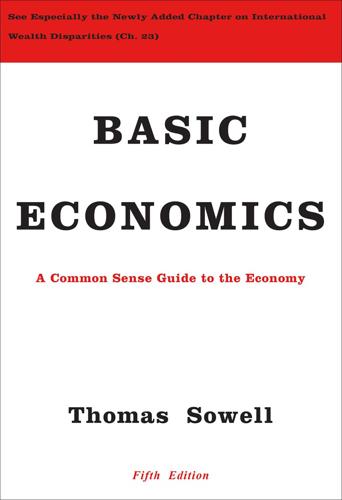
Basic Economics
by
Thomas Sowell
Published 1 Jan 2000
{470} John Tierney, “Betting on the Planet,” New York Times Magazine, December 2, 1990, pp. 52–53, 74–81. {471} “1,001 Years of Natural Gas,” Wall Street Journal, April 27, 1977, p. 26. {472} “Is the World Running Out of Oil?” Wall Street Journal, October 8, 2005, p. A5. {473} Robert L. Bradley, Jr., Julian Simon and the Triumph of Energy Sustainability (Washington: American Legislative Exchange Council, 2000), p. 42. {474} Patrick Barta, “Comeback in the Outback,” Wall Street Journal, March 26, 2007, p. C6. Chapter 14: Stocks, Bonds and Insurance {475} “Uncle Sam Stocks Up,” Wall Street Journal, March 26, 2008, p. A14. {476} Natalie McPherson, Machines and Economic Growth: The Implications for Growth Theory of the History of the Industrial Revolution (Westport, CT: Greenwood Press, 1994), p. 40

Post Wall: Rebuilding the World After 1989
by
Kristina Spohr
Published 23 Sep 2019
Bush’s Address to the Nation on the Suspension of Allied Offensive Combat Operations in the Persian Gulf 27.2.1991 9.02 a.m. Oval Office APP Back to text 193. Diary Entry 26.2.1991, printed in Bush & Scowcroft A World Transformed p. 484; Inaugural Address, 20.1.1989 APP; Remarks to the American Legislative Exchange Council 1.3.1991 APP; and Radio Address to United States Armed Forces Stationed in the Persian Gulf Region 2.3.1991 APP. For a contemporary reflection on the Vietnam syndrome, see George C. Herring ‘America and Vietnam: The Unending War’ Foreign Affairs 70, 5 (Winter 1991/2) pp. 104–19 Back to text 194.